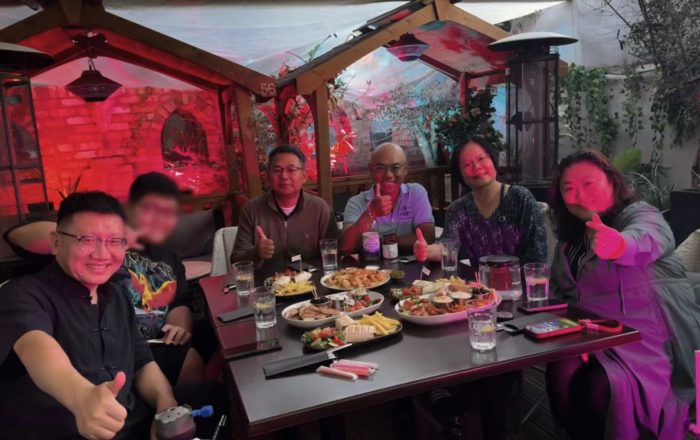
Field Visits on British Modernization and Its Global Development Experience (July – August 2024)
On January 20, 2024, Professor Zhao Kejin, Deputy Dean of the School of Social Sciences at Tsinghua University, visited the Global China Academy Centre. He brought with him the last wish of the late Professor LI Qiang (1950-2023), former Chinese Chair of the Global China Academy Council—namely, to continue developing the relationship between the two institutions. Professor Zhao also discussed matters of cooperation. Additionally, he brought a gift from Professor FANG Lili, President of the China Chinese for Anthropology of Arts, her book Fei Xiaotong’s Inquiry: How Human Society Can Achieve ‘Beauty in Diversity and Shared Harmony’, as well as a personal gift of his own books.

2024年1月20日,清华大学社会科学院副院长赵可金教授访问了全球中国学术院中心,带来了已故中国全球学术院理事会前中方主席李强教授(1950-2023)的遗愿——继续发展两院关系,并就合作事宜进行了讨论。赵教授同时还带来了中国艺术人类学会会长方李莉教授的赠书《费孝通之问:人类社会如何走向“美美与共”》以及他个人的赠书。
李强教授作为学术院理事会的中方主席,他在去年12月的突然离世对我们学术院来说是一个重大的损失【注释1】。我们怀着感激之情,铭记他过去十年来对我们工作的支持,以及他为两院合作关系所做的贡献。例如,在第六届全球中国对话:世界和平治理中,他推荐赵可金教授前来英国做大会致辞;在筹备第七届全球中国对话:全球治理改革期间,他确认清华大学社会科学院为全球中国对话系列论坛的支持单位,清华大学全球产业研究院为赞助单位,并提供了包括来自清华大学社会科学院和中国社科院的所有中方发言嘉宾。尽管受到新冠疫情的影响,依然确保了我们的第七届全球中国对话于2021年在英国学术院成功举办了线下线上融合会议。【注释1】
为了继续加强和巩固双方的联系,我们希望通过与清华大学社会科学学院延续并深化这种合作关系。继今年1月20日赵可金教授来访时讨论的暑期访问计划后,6月初赵教授与常教授就两个访英项目进行了确认:一个是在此之前的为期22天(7月27日至8月17日)的赵可金教授对近代英国现代化及其全球发展经验的考察。另一个是为期八天(8月17日-24日)的京沪四高校人工智能发展及全球治理对英国的访问(详情点击链接)。学术院信托会和理事会对清华学者来英国访问高度重视,学术院理事会主席托尼·麦肯勒里 Tony McEnery 教授与院长常向群教授基于以前的邀请函模板上联名签发了邀请函,明确了所有的活动安排和服务均由全球中国学术院提供,费用由清华大学全球产业研究院承担。尽管是假期,我们学术院确保每一项重要活动都有学术院不同方面的领导或院士参加。学术院的行政团队表示,与以往的商业外包服务不同,这次在主要接待环节将由我们团队的负责人亲自接待。
本页是全球中国学术院帮助和参与赵老师完成这个项目的记录。在策划方面,相关城市的主要参访的地方和介绍及其路线基本上是我们提供的。在清华大学社科学院的要求下,我们在伦敦、牛津、伯明翰、曼彻斯特、格拉斯哥、剑桥等地京可能安排了学者会见,而且全程安排了志愿者、友人和专业人士进行接应或陪同,并建立了微信群及时分享信息,确保了每个环节顺利进行。以下将按时间顺序以图文方式简要回顾这一过程,不仅是为了记录活动,更是为了公开透明地展示我们所做的工作和付出的努力。【注释2】
7月27日,伦敦(一)
全球中国学术院负责活动的官员梁凯在伦敦希思罗机场 (T2) 于17:45迎接了赵可金教授及其夫人和儿子。由于出关延误,他们于20:30才抵达 The Madonna Halley Hotel的The Shisha Garden。这是一家希腊风格的花园餐厅,其环境充满了异国情调,装饰着茂密的植被和精心设计的灯光,营造出一种神秘而迷幻的氛围。学术院后勤经理刘大卫和常教授在此为他们设宴接风。
晚餐的菜品也很多样化,例如:小吃拼盘包括哈罗米奶酪、鹰嘴豆泥、酸奶黄瓜酱、皮塔饼、橄榄、黄瓜和番茄沙拉;鸡肉小吃拼盘则在此基础上还包括鸡胸肉片。大家对哈罗米奶酪印象深刻,感觉很像豆腐干。还有一些混合卷饼,包括腌制鸡胸肉和羊肉,配上酸奶黄瓜酱、甜辣酱、酸黄瓜和粉色腌菜,包裹在玉米饼中,搭配薯条或沙拉;凯撒鸡肉卷饼则包括香脆鸡柳、生菜、西红柿、凯撒酱和一点甜辣酱,同样包裹在玉米饼中,搭配薯条或沙拉。此外,还有玉米片,上面撒有奶酪和肉丁,配有莎莎酱、酸奶油、鳄梨酱、腌辣椒和奶酪蘸酱。这里的披萨的味道也很好。这些菜肴展示了融合风味的特色,提供了丰富的口感和味觉体验,突显了与中餐不同的另一种色香味俱全的餐点及分享式的就餐方式。

餐后的“饮品”欢迎聚会是在赵老师及家人到学术院“院士之家”稍事安顿后举办的。有大果盘包括新鲜水果和蔬菜及各类小吃,还有新扎的柠檬薄荷饮料,以及“睡觉茶”。

7月28-30日,牛津。
常教授开车把赵教授夫妇的行李送往牛津里奥纳多皇家酒店 Leonardo Royal Hotel Oxford,再把他们的儿子送到牛津拉德利公学去上暑校,并安顿好。然后与赵教授夫妇一起参观了阿什莫林博物馆 Ashmolean Museum,这是英语世界中第一个成立的大学博物馆,也是第一个公众博物馆 Public Museum。我们按照历史的时间顺序和地区欣赏不同的文物和文明,同时在记忆中搜索他们与同期中国的文物与文明的异同。

午餐会安排在Parsonage Grill,是牛津的精致的欧洲和英国菜肴餐馆,距离阿什莫林博物馆仅0.2英里。与牛津大学全球与区域研究学院当代中国研究项目高级研究员叶玛丽教授Maria Jaschok 会谈,她也是全球中国学术院信托会主席和院士。主要讨论全球治理与AI和国际关系与秩序等问题。
学术院安排在牛津负责接待的是住在牛津的伦敦大学学院博士候选人程语桐(上排照片右数第一张,左边第一位)。她于7月28日下午两点在阿什莫林博物馆门前与我们几位老师会面。之后我们一起参关了博物馆。
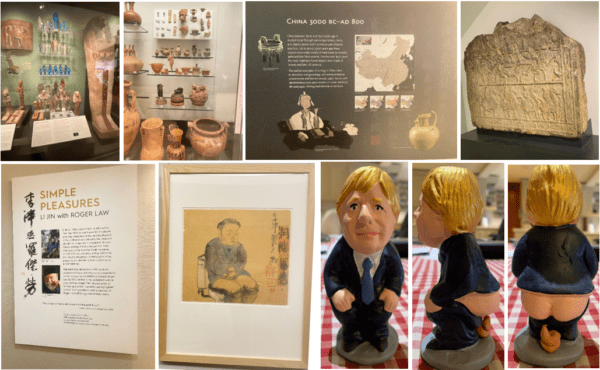
在阿什莫林博物馆有一个具有鲜明跨文化意味的中西联展:一边是中国当代画家李津,以水墨描绘饮食、如厕、闲坐等日常身体场景,将“不入画”的生活细节带入文人画传统;另一边是英国讽刺艺术家 罗杰·劳Roger Law,以玩偶化、卡通化的雕塑解构公众人物与政治权威,使权力回到可被观看、可被调侃的肉身之中。两位艺术家分属不同文化脉络,却都以身体与日常为入口,消解宏大叙事,使文明在最具体的姿态中显形。
正是在这样的展览语境中,当叶玛丽教授向我们介绍李津那幅描绘人物坐在坐便上的画作前时,常教授忽然产生了一个生活化的联想:她公公家有一尊英国前首相 鲍里斯·约翰逊 Boris Johnson 的讽刺小雕塑。那件小雕塑正面庄重、背面滑稽,其幽默的身体处理方式,是西班牙加泰罗尼亚地区的民俗传统“排便人偶” Caganer的作品:一种起源于18世纪、象征土地丰饶与好运的形象,后来被用于塑造各类公众人物,以笑意消解权威、拉近权力与日常生活的距离。
这一联想让人意识到,李津的水墨人物与 Roger Law 的讽刺雕塑,并非仅仅在展厅中并置,而是在更广阔的生活经验中相互呼应:当身体成为共同语言,博物馆、家庭记忆与旅游文化在同一瞬间被串联起来,转文化理解也因此自然发生。
在一起参观完博物馆后,我们找到了去赵教授下榻的酒店的6号线公交车站(下面照片左一)。由于语桐告知30日去伯明翰的铁路罢工,于是我们一起到长途汽车站协助赵老师买好了去伯明翰的车票。之后,语桐陪他们一起参观了牛津的著名地标,包括圆顶图书馆和Bodleian Library。又前往Cover Market,在那里一边闲逛,一边交流。

7月29日清晨,语桐在6号线公交车站接到赵教授夫妇一同前往牛津大学中国中心。由于常教授事先联系了该中心的图书馆馆长苏诺 Mamtimyn Sunuodula 博士,他非常热情地接待了他们,并带领我们参观了中心的各个设施。在参观过程中,苏诺馆长详细介绍了中心的历史、发展情况以及在中英文化交流中所扮演的重要角色(上排照片中间三张)。参观结束后,语桐陪他们沿着大学公园步行前往自然历史博物馆,路过牛津大学全球与区域研究学院(上排照片右数第一张)。在自然历史博物馆,他们欣赏了馆内丰富的展品,感受到牛津浓厚的学术底蕴。
7月30日上午,语桐陪同赵教授夫妇前往牛津长途汽车站,把他们送到了前往伯明翰的长途汽车。
7月30-31日,伯明翰
7月30日中午,赵教授夫妇乘长途汽车到达了伯明翰,下榻在伯明翰市中心的皇冠假日酒店。我们学术院安排的英国大道咨询集团王澍斌总裁和他的两位同事,当晚为他们在英国排名第三的、伯明翰最好的中英粤菜餐厅Chung Ying Cantonese Restaurant为赵老师夫妇接风(下排照片左1)。

7月31日上午,王总陪赵教授夫妇沿着伯明翰历史最悠久的运河进行了步行探索,这里是由煤炭个钢铁贸易而发展起来的,也是著名电视剧《浴血黑帮》 peaky blander的取景地。然后他们去了智库伯明罕科学博物馆 Thinktank Birmingham Science Museum ,伯明翰科学历史博物馆,完整介绍了作为中部重要工业城市的发展史。
下午,王总陪赵老师夫妇参观了著名的红砖大学伯明翰大学,走过英国最高的单体钟楼 (101米高) ,百年历史的主建筑群以及李四光先生曾学习研究的教学楼。王总还安排了两位博士为他们介绍情况 (上排照片左2-3)。
然后,他们在王总家小憩交流,并一同品尝了苏格兰威士忌 (上排照片右1-2)。尽管伯明翰并不位于苏格兰,但作为英国最具多元性和国际化特征的城市之一,这里不仅汇集了来自苏格兰的威士忌,也汇聚了世界各地的酒类文化。常教授在交流中指出,在伯明翰品尝苏格兰威士忌,早已超越单纯的味觉体验,而成为一种日常生活中的饮文化学习:它让地方性传统在跨区域流动中被重新理解,也让人真切感受到苏格兰文化如何在英国其他地区持续传播并被吸收。这种通过物质、味觉与社交实践实现的文化转移,本身正是一种发生在日常生活中的苏格兰和英格兰之间的转文化过程。
根据赵教授夫妇在我们的微信群里发的感想和照片,常教授也有感而发,对所有的图片做了解释,为他们编辑了一篇“行走英国之伯明翰印象及感想”,并加入了一些注释。
8月1-2日,曼彻斯特
8月1日,我们安排的接应赵教授夫妇的接应是《英国社会学评论》研究博士后研究员胡正栋博士,他于上午10点半在曼彻斯特皮卡迪利车站接到赵教授夫妇后,帮他们拿着行李直接就city walk,边走边介绍曼彻斯特的一些景点,直接送达曼彻斯特市中心万豪酒店 (下排照片左1)。胡博士于3日一大早再来到酒店,把赵教授夫妇送到皮卡迪利火车站,送往了去格拉斯哥的火车 (下排照片右1 )。在曼彻斯特停留的两天里,赵教授夫妇基本按照学术院根据其考察主题所规划的路线展开参访。该路线围绕英国工业化、城市转型与社会文化制度的演变展开,通过博物馆、历史街区与公共文化空间的组合,让考察在行走与观看中逐步展开,也为后续城市之间的比较提供了共同的经验基础。

在根据赵教授在微信群分享的信息,在之后的两天里,他们参观了曼彻斯特科学与工业博物馆 Science and Industry Museum,作为世界上第一个工业化城市,该馆专注于展示科学、技术和工业发展历史,馆内收藏了许多与曼彻斯特工业革命有关的展品。还参观了约翰·赖兰兹图书馆John Rylands Library,馆内收藏的许多珍贵的手稿和古籍成为一座学术宝库,其哥特式建筑风格成为曼彻斯特最著名的历史建筑之一。曼彻斯特中央图书馆Manchester Central Library则是新古典主义风格,其圆顶和柱廊设计深受罗马和希腊古典建筑的影响(上图左2-4)。
他们还参观了曼彻斯特的罗马堡垒遗址Castlefield,这是曼彻斯特市内保存较好的古老罗马防御工事的遗迹。是英国的重要考古遗址之一。后方隐约可见现代的高楼建筑,构成曼彻斯特城市现代化与历史文化交织的一个典型景象。曼彻斯特大教堂Manchester Cathedral,建于中世纪的这座哥特式建筑以其高耸的塔楼、高大的窗户、精美的彩色玻璃窗、复杂的石雕和尖顶设计闻名。教堂的内部和外部都具有极高的艺术和历史价值。
之后,他们前往曼彻斯特北区的 Northern Quarter 史密斯菲尔德市场Smithfield Market。这里保留着大量老建筑与复古风格的历史街区,但原本的工业与批发空间如今已被改造为商店、餐厅和艺术空间,呈现出一种典型的城市再生景观。
这一行程并非偶然,而是常教授在整体路线规划中刻意安排的一站:它所呈现的城市转型经验,在不同国家与制度背景下反复出现,具有高度的可比较性。她在行程设计时便意识到,这类空间在全球许多城市中都能找到相似形态——如法国的蓬皮杜艺术中心、伦敦的泰特现代美术馆、以及北京的798艺术区等。通过把曼彻斯特的这一站放入整体考察路线之中,她希望让参与者在不同城市的行走中,逐步体会到工业遗产如何在不同文化与制度语境中被重新激活。这种通过行程设计实现的比较经验,本身正是一种转文化实践:它不是发生在展厅或课堂中,而是通过移动、观看与路径安排,在行走中生成理解。
人民历史博物馆 The People’s History Museum是一个独特的文化空间,致力于保存和传承关于工人阶级历史的记忆,英国劳动人民和社会变革的历史,特别是工人阶级的斗争、民主发展和社会正义运动的历史。帝国战争博物馆 Imperial War Museum 以其现代、独特的设计以及深刻的展览内容成为了曼彻斯特及其周边地区的重要文化场所,专注于展示20世纪以来战争对人们生活的影响。
8月3-7日,格拉斯哥
8月3日上午11点多,我们安排的志愿人员、格拉斯哥大学电子信息工程专业的研究生南宇航到格拉斯哥火车站,把赵老师夫妇接送到SEC万怡酒店。她又于8月7日把他们送到机场回伦敦。期间也参加了部分陪同工作。
8月4日下午2点,我们安排的另一位志愿人员英国中非桥的执行总裁周霄飞博士,介绍了一位研究生卢纳熙,与南宇航一起陪同赵老师夫妇参观了历史文化遗迹格拉斯哥大学主楼,格拉斯哥大学博物馆,还有一些教学楼,如亚当斯密楼,商学院,统计楼,这些都是周博士读书和工作过的地方(见最后一组照片左边四张)。大家还交流一下这个格拉斯哥的历史经济文化,包括造船业中心,还有苏格兰来自英国一些工业化的进程方面,并探讨了一些学术问题探讨。宇航补充道,赵老师还跟他们探讨了人工智能与人文科学之间的联系,以及国内外居住的不同感受。
在格拉斯哥大学博物馆,周博士向赵教授夫妇介绍了一幅镇馆之宝——《坤舆全图》(下面组图左二两张)。他们在微信群里分享后,常教授指出了这个转文化产品transcultural prodect的多重性。1)继利玛窦(Matteo Ricci)于1602年坤舆万国全图 Kunyu Wanguo Quantu后,这张《坤舆全图》是结合了西方和东方的地理知识的第一张引入中国的现代世界地图 。“坤”在中国古代哲学中代表地,是《易经》中八卦之一,象征着大地和母性;“舆”在古代汉语中有车的意思,但在地理学和制图学中,它指的是承载万物的大地或世界。因此,“坤舆”可以理解为“大地”或“世界”的意思。与其他西方地图的不同之处。这个名字强调了它的中国背景和中西结合的特性。2)“全图”即“完整的地图”,表示这是一张涵盖整个世界的地图。3)比利时科学家和耶稣会传教士南怀仁(Ferdinand Verbiest)受清朝皇帝康熙的邀请,成为了钦天监的天文学家,其《坤舆全图》反映了中西方在17世纪的科学和文化交流。4)利玛窦和南怀仁在中国绘制的世界地图,均结合了当时最新的西方地理知识和中国的传统地理知识。这种融合不仅为中国人提供了一个全面了解世界的机会,也促进了中西方在地理学、科技、文化、政治、外交等多方面的交流。
8月5日,赵可金教授夫妇参观了格拉斯哥大教堂Glasgow Cathedral——这是一座始建于中世纪的哥特式教堂,也是苏格兰保存最完整的中世纪宗教建筑之一;随后在雨中走访了河滨博物馆Riverside Museum与克莱德河沿岸。河滨博物馆位于克莱德河畔,集中展示了格拉斯哥的工业、交通与造船历史,是理解这座城市工业化进程的重要窗口。其后,他们乘坐城市观光巴士Sightseeing Tour 环绕市中心,对格拉斯哥的历史结构与城市风貌形成了整体认识。

常教授在与哥拉斯哥大学社会政治科学学院政治学教授、苏格兰中国研究中心主任杜珍Jane Duckett 教授联系赵可金教授的安排时,根据赵教授考察的主题,她建议应该去Lanark小镇参观New Lanark。
8月6日 上午,赵可金教授从格拉斯哥中央火车站Glasgow Central 乘坐火车约四十五分钟抵达拉纳克 Lanark 小镇,前往参观由罗伯特·欧文 Robert Owen 创建的社会主义公社遗址。列车抵达后,他步行了二十多分钟,来到位于克莱德河谷中的新拉纳克 New Lanark村庄,距离拉纳克镇约2.2公里。新拉纳克最早由苏格兰商人大卫·戴尔David Dale 于1786年建立,原计划与水力纺纱机发明者理查德·阿克莱特 Richard Arkwright 合作,利用湍急的克莱德河水力兴建纺织工厂,将这里打造为未来的苏格兰“曼彻斯特”。赵可金教授夫妇实地参观了新拉纳克世界遗产地 New Lanark,对早期工业化与社会改革实践有了更直观的认识(见上面照片右边两张)。
当日下午3点,赵可金教授返回格拉斯哥大学,与杜珍Jane Duckett 教授在格拉斯哥大学孔子学院举行会谈。此次会谈得以促成,得益于正在格拉斯哥大学进行学术交流的南开大学前副校长、全球中国学术院终身院士朱光磊教授的协助与引荐。杜珍教授对赵可金教授采纳其建议,并于8月5日下午和8月6日上午分别参访河滨博物馆Riverside Museum与新拉纳克New Lanark 表示欣慰,认为此次实地考察收获颇丰。

以上右边的照片从左至右:赵可金夫人、格大孔院外方院长龙多、杜珍、赵可金、朱光磊、孔子学院中方院长周申(南开大学经济学教授)。
常教授认为,赵可金教授在新拉纳克(New Lanark)村庄的参访,与清华大学社会科学学院长期开展的清河实验之间,具有开展比较研究的可能。两者虽处于完全不同的历史与制度语境,却同样以社区为尺度,通过制度设计、社会实践与日常生活的持续互动,探索社会秩序与公共治理的可能路径。
此外,清河实验本身也具有重要的纵向比较价值。早在近百年前,1928年,燕京大学社会学家杨开道、许世廉等学者就在河北清河开展乡村建设实践,试图通过社会工作方法改造乡村社会,这一实践被称为民国时期的“清河实验”,是中国早期乡村现代化建设的重要社会实践之一。2014年起,清华大学社会学系李强教授等人在北京市海淀区清河街道启动了新一轮创新城市治理试点。2016年,李强教授邀请马丁·阿尔布劳(Martin Albrow)、常向群教授以及韩国学者韩相震教授等参观新“清河实验”点,该实验以城市社区治理为主题,开展参与式社区更新与社会治理创新,旨在打破传统行政主导模式,引入社会工作专业方法,推动居民广泛参与社区公共事务治理,是探索中国特色城市社会治理现代化的典型案例。围绕这一实践,李强教授及其学生已形成了一系列阶段性研究成果。常教授认为,若能在此基础上进一步补充相关研究,并与本次英国考察中获得的新拉纳克历史材料与现实观察相结合,不仅可以深化对制度演化与社会实验的比较分析,也有望形成一篇结构完整、具有理论厚度的转文化研究文章。
在赵教授行程交流的微信群中,他感慨道:“英国的乡村太美了,我终于理解了为什么代议民主会起源于英国乡村。”对此,梁凯回应说:“英国的人文灵魂,确实在乡村。”这段简短的交流,成为此次考察中一个意味深长的瞬间,也点出了乡村空间在英国政治文化与社会传统中的深层意义。
8月7日, 伦敦(二)
中午赵教授夫妇回到了伦敦,按计划是休整一下。稍事休息后,约两点出发,赵教授夫妇在常教授的陪同下,继续考察学术院的院士之家周边出行购物等情况;同时了解代表团的住宿安排等。
先是去了Edgware地铁终点站和购物中心,向工作人员了解伦敦交通付费和线路等情况;接着去了Mill Hill Broadway火车站;经过Rising Sun 餐馆(赵教授居然认出来了,显然他是做过功课的过,因为学术院安排8月13日这里用餐),又经过一个老人养老社区,我们下来考察了一番(见下组照片上排左数第一、二张)。
从养老社区出来后在转盘边有一家牛肉餐馆Miller & Carter – Steakhouse Restaurant ,我们的院士之家的“行走聊天”的第五条路线包括在这家餐馆用餐。然后我们去了一家购物园Borehamwood Shopping Park。常教授向赵教授夫妇介绍,之前在Edgware购物中心里的Sainsbury’s 和购物园附近的Tesco是中等超市;Waitrose和M&S是较高档的超市;ASDA和Morrisons大概是中等偏下;有两家德国的小超市Lido和Aldi属于比较低端的,正好在这个购物园的M&S一边一个(见下组照片上排右数第二张)。
之后我们去了这次代表团下榻的酒店 The Manor Elstree 考察。该酒店是位于赫特福德郡博勒姆伍德Elstree, Borehamwood的都铎风格乡村庄园酒店,距离伦敦市中心乘火车约25–30分钟。该庄园最初建于16世纪中期,20世纪60年代改建为酒店,融合了历史建筑风貌与现代舒适设施。酒店拥有约49间风格各异的客房与套房,坐落在10余英亩的花园与林地之中,环境宁静宜人。酒店设有餐厅、酒廊和下午茶空间,并配备宴会厅与会议设施,适合举办婚礼、学术会议及各类社交活动。其幽静的乡村氛围与便捷的区位,使其成为兼具历史感与实用性的理想下榻之所。赵老师夫妇对此非常满意,认为这里可以是以后与学术院合作培训企业家的地方。(见下组照片下排左数第1-3张)。我们还与没住在酒店,仅到这里来喝茶徒步的人一起聊天。由此,常教授想到,这里可为学术院院士之家的Walking and talking增加的第7条路线。
回到院士之家,赵教授用在购物园买的食材亲自下厨,做了三个菜:鸡肉丝炒茄子柳,鸡肉丝炒土豆丝,鸡蛋炒西红柿,我做了麻辣洋葱豆干丝,但是忘了煮饭,好在我们都不大吃主食,土豆和豆腐都有碳水化合物,开心地享用了我们自己动手的成果。这个经历非常难忘,不仅是这近一个月来,唯一的一次接受赵老师夫妇请吃的饭,赵老师不小心打破了我的一个精美的陶彩盘,虽然被修复了,也成为了永久的纪念(见下组照片下排右数第二张)。
晚饭后,赵教授与常教授到米尔希尔Mill Hill Gold Club去打高尔夫球。该改俱乐部建于1927年,坐落于167英亩林地,是米德尔塞克斯最具历史的球场之一。球场由J. F. Abercrombie 与 H. S. Colt 先后设计,历经多次调整,兼具挑战性与传统风貌。俱乐部会所由庄园旧建筑改建而成,集运动、社交与文化功能于一体,至今仍是伦敦北部重要的休闲与交流场所。赵教授不会打球,欣赏了球场的精致,常教授虽然只打了五个洞,也算是部分地感受了学术院院士之家的第二条行走聊天的路线。
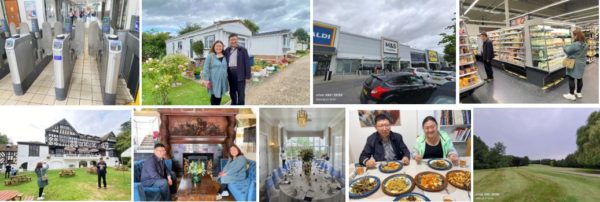
8月8-9日, 伦敦 (三)
8月8日,学术院给赵教授夫妇的安排是到博罗市场Borough Market 博罗市场。这是伦敦最古老和最著名的食品市场之一,位于伦敦桥附近的市中心。拥有超过一千年的历史,它是美食爱好者的活力中心,提供多种多样的新鲜农产品、美食和手工艺品。市场摊位出售从有机水果和蔬菜到国际美食、奶酪、肉类和烘焙食品等各种商品。博罗市场还以其热闹的氛围闻名,是当地人和游客体验伦敦美食的热门目的地(见下图)。

赵教授全家在院士之家用了两个studios:一个双人(他们夫妇)的和一个单人的(他们的儿子)。在他们回到伦敦前,学术院的工作人员在他们各自小厨房的冰箱里装满了水果、蔬菜、牛奶和矿泉水;另外,在他们外出前为每人也提供了外带的营养小吃、水果和水(下组照片左数1-3张)。

8月9日,赵教授夫妇主要是修整。他们在学术院附近转转,上组照片右数第1张照片是赵教授在微信群里分享的照片,他感到伦敦的天气挺好的。这张照片拍的是在公交车292站后面的房子。从院士之家到该公交车站仅2分钟步程,一个方向可以去他们之前去过的Borehamwood购物园,另一个方向可去Edgware地铁站。
8月10日,牛津(三)/ 伦敦(四)。
早上8点,学术院项目经理余莉女士到学术院院士之家接赵可金夫妇去牛津Radley College暑期学校接他们的儿子。之后拜访了在牛津大学经济学系访问的龙登高教授,之后参观牛津大学并交流。之后安排的是去比斯特购物中心。这个奥特莱斯购物村展示了现代零售业和服务业的成功案例,反映了全球化经济中的消费文化和商业模式。结合这两者的参观体验,可以从不同角度更全面地理解英国现代化进程及其在全球发展中的经验和影响。
晚上回到院士之家聚餐。正好南开大学前副校长、全球中国学术院院士朱光磊教授全家来访(见朱光磊教授访问英文网页)。学术院信托董事会前主席 Ingrid Cranfield 亦出席接待。Ingrid 现任环球世纪出版社社长,曾任恩菲尔德市副市长。席间大家就学术与交流事务进行了深入交谈。赵可金教授分别向常向群教授与 Cranfield社长赠送了小礼品(下组照片左数1–3)。晚宴甜品为 Ingrid 亲手采摘的苹果与黑莓制作的传统英国黑莓苹果派Blackberry and Apple Pie。晚宴结束时已是九点多,英国夏夜天色仍未完全暗下,赵教授全家与 Ingrid 及陪同其前往牛津的余莉在分别时合影留念(下排照片右数1–2)。

8月11日,温莎 /伦敦(五)。
8月11日,赵可金教授夫妇围绕“近代英国现代化及其全球发展经验研究”主题又开展了一整天的调研行程。上午,他们参观了温莎城堡Windsor Castle及温莎小镇。作为英国君主制的重要象征,温莎城堡不仅展示了英国在建筑技术、文化遗产保护与旅游业发展方面的现代化经验,也体现了君主制在公共服务与国家形象塑造中的持续作用。随后,赵教授夫妇走访了伊顿公学 Eton College。这所创立于1440年的私立学校培养了多位英国首相与世界级领导人,其教育制度与传统为理解英国精英教育与制度延续提供了重要案例(下面照片左数1-3)。
下午,他们前往伦敦的威斯敏斯特教堂,欣赏管风琴演出,从宗教、音乐与公共文化空间的角度进一步体会英国历史与现代性的融合(下面照片右数之一)。

傍晚,赵教授与伦敦经济学院LSE美国中心主任 Peter Trubowitz 教授会面,就清华大学与LSE的合作事宜进行了深入讨论,确认了8月22日会议安排的细节。随后共进晚餐,晚间乘地铁与公交返回院士之家。当天的行程从王权、教育、宗教文化到学术合作,构成了对英国现代化经验的一次系统性观察。
8月12日,伦敦(六)。
8月12日上午,赵可金教授前往维多利亚与阿尔伯特博物馆Victoria and Albert Museum(V&A)参访。作为世界领先的艺术与设计博物馆,V&A收藏了涵盖陶瓷、玻璃、纺织、时装、家具、珠宝、摄影与雕塑等门类的丰富藏品,时间跨度从古代至当代,系统呈现了不同文明与时代的设计成就。博物馆本身的维多利亚时代建筑亦展示了当时的建筑技术与审美理念。通过其策展、运营与数字化服务模式,V&A为理解英国在艺术设计领域的全球影响力及博物馆现代化治理提供了重要经验。
中午在伦敦市区用餐后,下午前往考文特花园 Covent Garden。这一由历史市场演变而来的公共空间,体现了伦敦在城市更新、商业发展与公共空间管理方面的现代化路径(见下面照片1-4)。其后,赵教授夫妇与在伦敦的朋友进行了交流。

当天上午和下午,赵教授的夫人在家休整,他们家人用的两个studios和院士之家的公用洗衣机,三台洗衣机同时启动,洗了很多衣物,感觉住在院士之家非常方便,应有尽有。
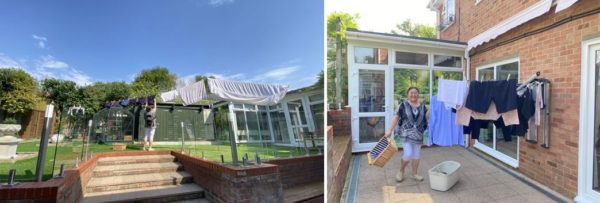
傍晚,常教授与赵夫人一起乘地铁到在皇家阿尔伯特音乐厅Royal Albert Hall与赵教授和他们的儿子汇合,一起参观了音乐厅,并音乐厅内的 Elgar Room一起享用意式晚餐。赵夫人说,在地铁上看不到英国白人,原来他们都在这里。

之后,我们一起在这里观看了 BBC 逍遥音乐会The BBC Proms 2024, Prom 32。这一创办于1895年的公共音乐制度,至今仍是英国夏季文化生活的重要组成部分。本场音乐会将现代作曲家的作品与贝多芬《第七交响曲》并置,展现了英国在公共文化体系中对传统与创新并行的长期坚持。音乐会由英国国家威尔士交响乐团演出,尼尔·文迪蒂(Nil Venditti)指挥,萨克斯管独奏为杰斯·吉勒姆(Jess Gillam),曲目涵盖格蕾丝·威廉姆斯、卡尔·詹金斯、路易丝·法伦克的现代作品,以及贝多芬A大调第七交响曲。音乐厅内相对单一的观众结构,与伦敦街头的高度多元形成鲜明对比,也提示英国文化现代化中“核心文化的稳定性”与“社会多样性的开放性”之间的张力——这种并存本身,正是英国现代化的重要特征之一。通过这一兼具传统与创新的音乐体验,赵教授夫妇进一步体会到英国在公共文化制度、艺术传播与国家文化生活中的现代化实践。
8月13日,伦敦(七)
8月13日,赵可金教授围绕“近代英国现代化及其全球发展经验研究”继续开展实地考察,并同步为即将到来的四校代表团行程做前期准备。当日主题为英国历史与文化(三),由梁凯负责接待与协调。上午,赵教授与家人从 Edgware Station 出发,经 Waterloo 换乘 South Western Railway 抵达 汉普顿宫 Hampton Court Palace。作为英国重要的王权与历史建筑遗产,汉普顿宫集中呈现了英国在建筑技术、园林设计与社会文化方面的演变,体现了皇家权力中心在英国现代化进程中的长期影响(下面组图上排照片左一)。
中午,梁凯陪同赵教授全家在汉普顿宫高尔夫俱乐部 Hampton Court Golf Club用餐(下面组图上排照片中间)。该俱乐部毗邻汉普顿宫王室园林,是一座历史悠久、环境优美的传统英式高尔夫俱乐部。球场坐落于泰晤士河畔的皇家绿地之中,融合了宫廷景观、林地与草地地貌,体现了英国将休闲运动、景观保护与公共文化空间相结合的传统。俱乐部不仅是高尔夫运动场所,也长期作为社交、交流与社区活动的空间,折射出英国绅士文化与现代休闲制度的发展脉络。
梁凯同时也是汉普顿宫高尔夫俱乐部的终身大使,是目前英国高尔夫俱乐部体系中唯一一位担任此类角色的华人。这一身份不仅体现了他个人在英国高尔夫界的长期投入与认可,也象征着华人社群在英国传统精英休闲文化中的逐步融入与可见性提升,从一个侧面反映了英国社会文化结构的开放性与演变。
下午他们参访基尤皇家植物园 Kew Gardens。该园不仅是世界领先的植物研究与教育机构,也展示了英国在科学研究、环境保护与全球知识网络中的持续影响力,为理解英国现代化中的科学制度与全球责任提供了重要案例(下面组图上排照片右一)。
傍晚,赵教授全家返回院士之家,与常教授和学术院执行经理刘大卫先生在 The Rising Sun Mill Hill 共进晚餐(下面组图下排1-4张)。Rising Sun 餐厅历史可追溯至16世纪,如今由富有创新精神的 Delnevo 兄弟经营。这家传统酒馆与餐厅,以其温馨的环境、精致的菜肴和优质的服务而闻名。菜单以意大利家族传统为灵感,并融入亚洲风味,呈现出独特而丰富的味觉层次,尤其以充满那不勒斯风情的披萨著称。这是院士之家的边走边聊的第三条路线的餐饮点。

8月14日,剑桥。
8月14日,赵可金教授继续围绕“近代英国现代化及其全球发展经验研究”开展实地考察,并为即将到来的四校代表团访问做前期衔接与铺垫。本日行程由梁凯总、林博士及孔珍妮接待。
上午首先前往剑桥以北的伊利大教堂 Ely Cathedral,这座中世纪建筑杰作展示了英国宗教、建筑技术与地方治理在现代化进程中的历史根基。伊利大主教堂里面有一个雕塑,可能是著名艺术家乔纳森·克拉克Jonathan Clarke创作的《生命之路》Way of Life 雕塑。它是以铸铝制作,顶部是一个风格化的十字架,下方是一条弯曲的道路。这是对基督徒信仰之旅的现代诠释,蜿蜒的道路象征着朝圣者通往十字架的旅程,而十字架代表着基督教信仰中精神生活的最终目标。该雕塑显眼地安装在伊利大教堂的墙上,与教堂融合历史建筑与当代艺术的理念相呼应,这件艺术品成为大教堂内宏伟哥特式内部的一处焦点,邀请人们沉思并反思它所代表的精神旅程 (下面组照片左数1-2)。
随后抵达剑桥大学菲茨威廉博物馆Fitzwilliam Museum ,创建于1816年,收藏涵盖欧洲绘画、雕塑、古典文物、亚洲艺术及手稿等,跨越数千年文明史。博物馆以其学术性与公共性并重的传统,体现了英国大学博物馆在知识保存、研究与公众教育中的重要角色,也是英国文化与学术现代化的重要组成部分。由林政升博士的接待下参观馆藏,了解英国大学博物馆体系在艺术、知识与全球文化交流中的作用。林政升博士 Dr James Lin 为剑桥大学菲茨威廉博物馆亚洲部主任,长期从事亚洲艺术史、物质文化与跨文化交流研究,尤其关注中国及东亚艺术在全球语境中的流动与再诠释。他在博物馆策展、学术研究与公共教育之间建立起紧密联系,推动亚洲藏品在英国学术体系与公众文化中的可见性,是英国博物馆界重要的亚洲艺术专家之一。陪同一起参观的还有孔珍妮 Jeni Kong,她是孔子第72代孙子孔维众Kong Weizhong的夫人,也是孔氏家族中极为罕见的西方成员。她长期生活于英国,在中英文化交流、教育与公共文化活动中积极参与相关工作,成为孔氏家族传统在当代西方社会中的一个独特延续与转文化实践案例。作为唯一的白人孔氏家族成员,她的身份本身即体现了儒家家族传统在全球语境中的开放性、流动性与再生能力,也象征着中国传统文化在跨文化、跨代际传播中的当代表达(下排照片右二中左2为林博士,右一为孔珍妮 )。
午餐在具有重要科学史意义的老牌酒馆 The Eagle 进行——DNA结构发现曾在此酝酿,体现了学术传统与公共空间的交汇。
下午,常教授与赵教授一起拜访了剑桥大学露西·卡文迪什学院院长、英国高等教育领域的重要人物——玛德琳·阿特金斯女勋爵 Dame Madeleine Atkins。她曾与2013年第八届全球中对话后接待过全球中国学术院的代表团。玛德琳曾是英国高教委员会基金会主席,现在剑桥英联邦、欧洲和国际信托基金会信托人,剑桥大学捐赠和外部法律事务委员会,大学学部委员,大学理事会成员等。她的头衔Dame,唯一的在高校工作获此殊荣的女性,相当于伦敦经济学院前校长吉登斯的Lord。我们就高等教育治理、国际合作与制度经验进行交流,也为后续代表团访问奠定基础(下排照片右一)。
傍晚行程转为轻松的城市生活考察,在Hatfield的Galleria购物中心进行观察式参访,这是一座由原飞机机库改造而成的奥特莱斯式购物中心,兼具工业遗产与现代商业特色。这里汇集了多家英国及国际品牌折扣店、餐饮与休闲设施,是当地居民与访客常去的购物与休闲空间,也体现了英国在旧工业建筑再利用与城市更新方面的现代化经验。晚餐在Real China,这是一家提供正宗中式菜肴的餐厅,以家常口味和稳定品质著称,深受当地华人和英国食客欢迎结束,这里构成院士之家边走表聊的第六条路线的一部分。

8月15日 伦敦(八)
赵可金教授围绕“近代英国现代化及其全球发展经验研究”,重点考察英国的经济金融体系、政府治理结构与信息传播体系。
上午,赵教授全家从院士之家出发,前往伦敦市中心与金融城一带,实地走访白厅及其周边的核心政府部门,包括唐宁街十号、内阁办公厅、商务和贸易部、文化媒体与体育部、教育部、能源安全与零排放部、环境食品与乡村事务部、外交联邦与发展事务部、卫生与社会福利部、内政部、住房、社区与地方政府部、司法部、交通部及财政部等。英国政府机构高度集中,空间布局紧凑,多为白色历史建筑,直观呈现了其高度制度化、低层级化的治理结构。
随后考察伦敦金融城,参观英格兰银行、伦敦证券交易所、劳合社及部分跨国企业总部所在地,并视时间前往伦敦港与东伦敦科技城(East London Tech City),观察金融、科技与城市更新之间的互动关系。中午在市区用餐。
下午,他们重点走访信息与传媒机构,先后参观位于波特兰坊的英国广播公司(BBC)新闻中心,并前往舰队街一带,了解《泰晤士报》《金融时报》《每日电讯报》《卫报》《观察家报》等英国主流媒体的历史空间与制度传统。BBC成立于1922年,是英国最重要的公共广播机构,其办公网络分布全国、运作高度灵活,伦敦总部仍是新闻与公共事务报道的核心枢纽。当日还考察了位于伦敦西区的中国环球电视网(CGTN)欧洲代表处,了解中国媒体在海外发展的路径及其与英国媒体生态的差异与互动。
以下是他们在微信群分享的部分照片。

8月16日 伦敦(九)
8月16日,考察主题聚焦英国经济金融体系与伦敦作为全球城市(Global City)的大都市治理结构。赵可金教授围绕“近代英国现代化及其全球发展经验研究”,上午前往伦敦金融城(City of London),实地考察英格兰银行(Bank of England)、伦敦证券交易所(London Stock Exchange)以及部分跨国企业总部所在地,并参观英格兰银行博物馆(Bank of England Museum),系统了解英国中央银行制度的历史演化与金融治理传统。支撑金融城运行的另一重要机构是英国皇家交易所(Royal Exchange),其空间与制度形态反映了伦敦金融体系的历史连续性。
随后考察伦敦大区新建的市政厅(City Hall),了解伦敦在区域治理、公共服务协调与国际城市治理中的制度设计与实践经验。上午还参观了白厅(Whitehall)及唐宁街10号(10 Downing Street)一带,考察伦敦议会(London Assembly)及相关政府机构的集中布局,理解伦敦作为国家政治中枢与国际都市的双重角色。
下午继续走访伦敦警察厅(Metropolitan Police Service)、伦敦消防队(London Fire Brigade)、国民保健署信托伦敦救护服务(London Ambulance Service NHS Trust)及伦敦港务局(Port of London Authority)等关键城市运行机构,从公共安全、应急治理、公共卫生与港口管理等方面,系统观察超大城市日常治理的制度结构与运行逻辑。
赵教授在微信群里做了大量的文字分享,以下照片为网上下载。

8月17日 伦敦(十)
当日,赵可金教授一行主要进行修整,并集中筹备清华大学及京沪四校代表团在英期间的接待与活动安排。此次接待对全球中国学术院具有特殊意义——这是学术院首次以整体策划、全流程组织的方式,系统接待并陪同国内高校学者在英国开展实地考察与学术交流活动。相关安排既是对前期考察工作的延续,也标志着学术院在跨国学术支持与组织能力上的一次重要实践。
在代表团抵达前,赵可金教授夫妇主动提出,希望其子参与部分接待工作,作为一次实际的社会参与与责任训练。全球中国学术院予以接受,并将其纳入志愿服务安排。父子合作的第一项任务,便是协调与学术院统一调度的车辆前往机场接机。代表团共7人,携带7件行李,乘坐CA937航班,于当日16:00–17:00之间抵达伦敦希思罗机场第二航站楼(London Heathrow T2),然后分别送往预定的酒店及学术院院士之家。
当晚,全球中国学术院在院士之家举办了欢迎聚会。自此,赵教授全家全程参与学术院为代表团安排的各项活动,与学术院团队、志愿人员共同推进代表团行程的顺利开展。随后,工作微信群正式更名为“四年六高校英国破冰之旅”,以纪念2020—2024年新冠疫情阻断的四年线下交流,以及此次共同参与的六所高校——除清华大学组织的京沪四校外(中国人民大学、首都对外经济贸易大学、复旦大学),还包括南开大学(朱光磊教授全家)与东北师范大学(张淑燕教授母女)等成员。
在整个行程中,赵可金教授持续在微信群中分享其考察体会;而全球中国学术院也首次将国内学者在英国开展系统性考察的全过程加以记录,并整理成此篇博文,以公开、透明的方式呈现学术交流背后的组织工作与跨文化协作过程。谨以赵可金教授在上述微信群中的致谢语作为全文结尾:“感谢清华的慷慨资助,感谢全球中国学术院的精心接待,感谢家人的亲情陪伴,感谢一路上无数朋友的无私帮助。面对未来,吾将风雨兼程!”
注释:
- 2023年11月,马丁·阿尔布劳教授到北京参加国际会议并在清华、人大等高校演讲,李强教授因新冠病毒感染已经住院抢救。
- 感谢非常感谢全球中国学术院邀请的志愿人员接力棒式的接应和陪同!他们是UCL博士生程语桐(牛津),英国大道教育咨询集团总裁、伯明翰华埠商会执行主席王澍斌王总及伯大的几位博士(伯明翰),《英国社会学评论》期刊的博士后研究员胡正栋博士(曼彻斯特),中非桥执行总裁、英中科创(创始)会长周霄飞博士和格拉斯哥大学研究生南宇航(格拉斯哥),很高兴大家都认为这段经历对各自也是有益的。感谢全球中国学术院理事会主席Tony McEnery教授,信托董事会主席叶玛丽Maria Jaschok教授、院长常向群教授、信托董事会前主席Ingrid Cranfield、学术院执行经理刘大全、活动官员梁凯、项目经理于莉在伦敦、牛津、剑桥的帮助,还有格拉斯哥大学的杜珍Jane Duckett 教授、剑桥大学玛德琳·阿特金斯女勋爵教授Dame Madeleine Atkins、林政升James Lin博士和孔珍妮Jeni Kong女士。
- 我们在向志愿人员分配工作前交代,要确保从车站到酒店和酒店回车站的顺利通畅,并且报销送往迎来的车费。各种参观景点是否陪同取决于彼此的时间和兴趣。
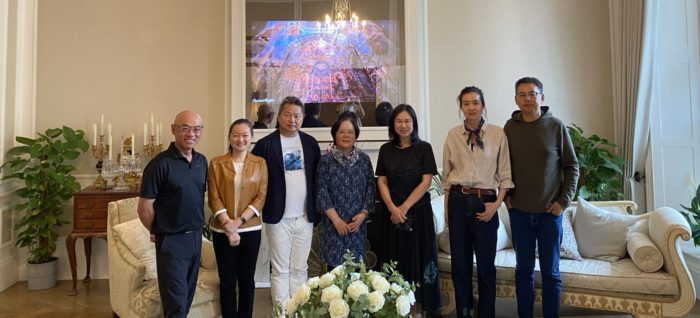
Understanding Social Mission Through Space: GCA Team-Building Activities in 2024
Since its founding, the Global China Academy (GCA) has upheld a dual commitment to academic excellence and social mission. While the academic mission is primarily realised through research, publications, and dialogue platforms, the social mission requires something more experiential: the integration of people, space, lived experience, and collective reflection.
In April and July 2024, the GCA team organised two carefully designed team-building activities in London. These were not conventional retreats, but learning journeys through space, using architecture, movement, and shared experience as methods to reflect on how an academic institution can fulfil its social responsibilities in contemporary society.
Together, the two events formed a coherent pathway—from neoclassical urban order to postmodern vertical living, from visible public space to hidden infrastructures of care—through which the GCA team collectively articulated a renewed understanding of its social mission.
I. 15 July 2024: Reflecting on Social Mission Between Neoclassical and Postmodern Spaces
1. Park Crescent: Public Life and Neoclassical Order
The July team activity began at Park Crescent, one of London’s most iconic neoclassical urban designs, created by John Nash in the early 19th century. The elegant curved terraces surrounding a central garden express an ideal of public life based on order, proportion, restraint, and responsibility.
Gathering at a colleague’s home, the team shared tea and discussed ongoing work and institutional challenges. The space itself shaped the discussion: neoclassical architecture is not merely aesthetic—it encodes a vision of civic duty and collective life. Conversations naturally turned to the question of how GCA can continue to serve society beyond academic production.
2. Nursemaids’ Tunnel: The Hidden Infrastructure of Social Governance
From the garden, the team entered the historic Nursemaids’ Tunnel, located beneath Park Crescent. Built in the 19th century, the tunnel allowed caregivers and service workers to move discreetly between homes and gardens without disturbing the visible order of elite residential life.
The tunnel offered a powerful spatial metaphor.
Above ground lies elegance and visibility; below ground lies the hidden labour and governance that sustains society.
Walking through the narrowing, echoing passage, the team experienced a moment of collective realisation: social responsibility is often embedded in invisible systems, connections, and acts of care.
For an academic institution to fulfil its social mission, it must learn to recognise and engage with these unseen foundations of social life.
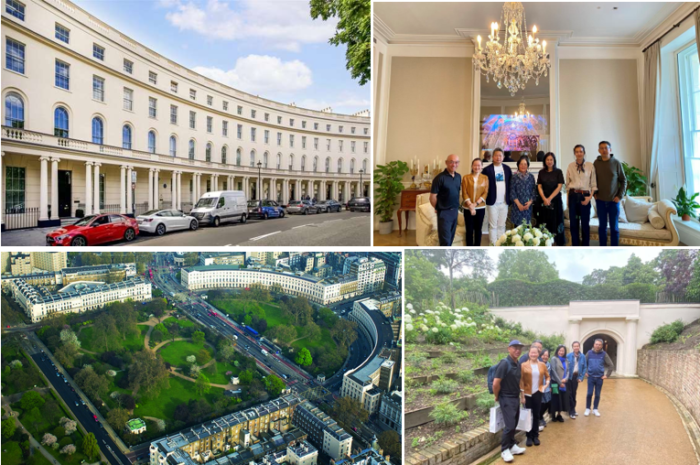
3. Landmark Pinnacle, Canary Wharf: Postmodern Vertical Living and Platform Governance
In the afternoon, the team travelled to Landmark Pinnacle in Canary Wharf, London’s tallest residential tower and a symbol of postmodern urban living. Here, shared amenities, bookable facilities, and digitally managed spaces define a highly systematised form of community life.
Exploring the communal areas, rooftop gardens, and shared facilities, the team reflected on a different model of social governance—platform-based, technology-mediated, and participation-dependent. From the upper floors, overlooking the Thames, the contrast with Park Crescent could not have been sharper.
This spatial juxtaposition clarified a central insight: the social mission of an academic institution today lies in building understanding and dialogue across different forms of social organisation.
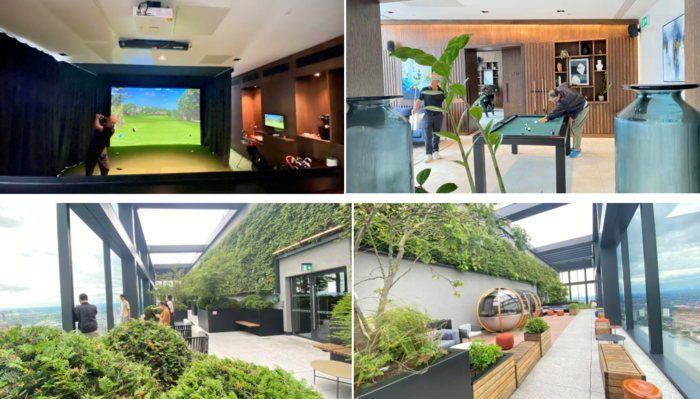
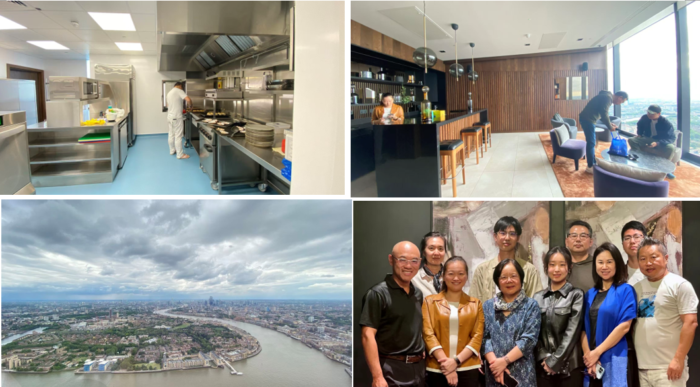
II. 27 April 2024: Learning Through Movement, Nature, and Shared Experience
If the July activity focused on spatial contrasts, the April activity emphasised thinking through movement and collective practice.
The day began at the GCA Fellows’ Home, where team members gathered for tea and discussion, followed by a visit to Mill Hill Golf Club. The rhythm of the game—balancing judgment, patience, and discipline—created a relaxed yet focused environment for exchange.
In the afternoon, the team visited Brocket Hall, a neoclassical estate deeply embedded in British political and cultural history. Walking together through the grounds, conversation flowed naturally. Dinner later that evening at the Real China Restaurant in Hatfield completed the day.
This occasion formally established GCA’s sixth “Walk and Talk” route—a method of embedding dialogue within landscape, history, and shared movement.
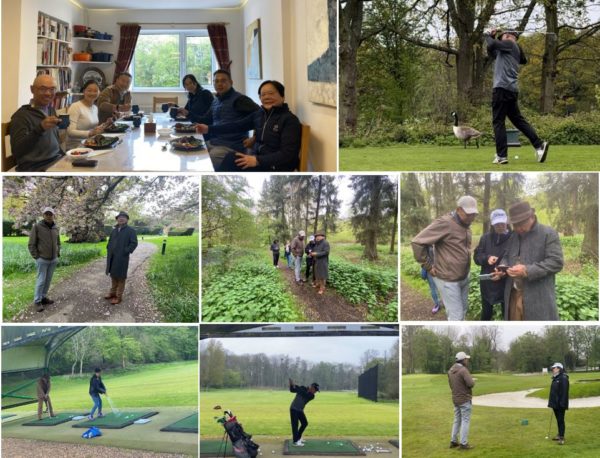
III. From Activities to Framework: How Social Mission Is Practised
Through these two events, GCA gradually articulated a clearer framework for its social mission:
- Social mission is not an add-on but an extension of academic purpose
- Space can serve as a pedagogical tool for understanding governance
- Transcultural dialogue emerges not only in meetings but in shared experience
- Future leaders must learn public responsibility in real social settings
Building on this understanding, GCA advances its social mission through:
- The Global China Dialogues (GCDs) as platforms for cross-sectoral exchange
- Leadership training and social engagement programmes for young political and business leaders
- Transcultural research and publishing that translate knowledge into public impact
- Experiential, space-based collective activities that bring academia into society
Conclusion: Learning Through Space, Acting Through Responsibility
From the neoclassical gardens of Park Crescent to the hidden passageways of Nursemaids’ Tunnel, from the vertical communities of Canary Wharf to the historic landscapes of Brocket Hall, the GCA team’s 2024 activities reaffirmed a shared conviction: Social mission is not a slogan, but a capacity that must be continually experienced, discussed, and practised.
The Global China Academy will continue to build bridges between scholarship, society, space, and people—advancing a form of global engagement grounded in responsibility, understanding, and collective action.
Participants in the activities in the top photo from left to right: Kai Liang (Event Officer), Katie Zheng (Administrative Manager), Alan Fang (Legal Adviser), Yu Li (Project Manager), David Liu (Logistics Manager), and Xiangqun Chang (President).
- Click here to view Understanding Social Mission Through Space: GCA Team-Building Activities in 2024 in Chinese
- Click here to view GCA’s Two-Day Team Building: Blending Academic Insight with Cultural, Historic and Nature Discovery
- Click here to view Professor Maria Jaschok FGCA has been elected as Chair of the Global China Academy Board of Trustees.
- Click here to visit the GCA news & blog section.
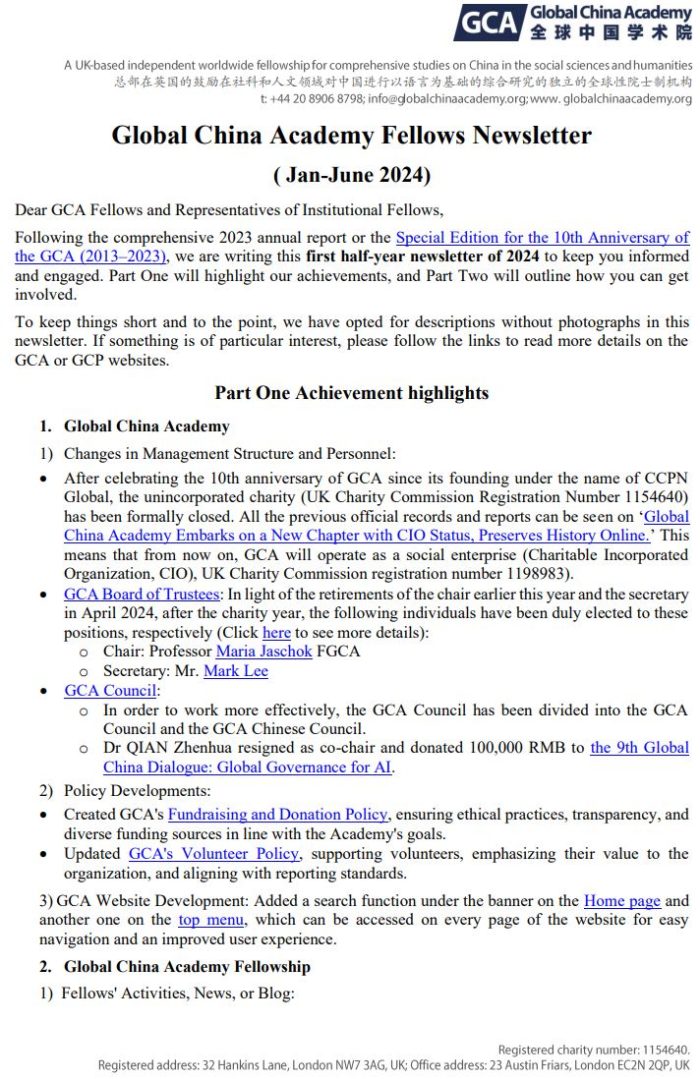
Global China Academy Fellows Newsletter (Jan-June 2024)
Dear GCA Fellows and Representatives of Institutional Fellows,
Following the comprehensive 2023 annual report or the Special Edition for the 10th Anniversary of the GCA (2013–2023), we are writing this first half-year newsletter of 2024 to keep you informed and engaged. Part One will highlight our achievements, and Part Two will outline how you can get involved.
To keep things short and to the point, we have opted for descriptions without photographs in this newsletter. If something is of particular interest, please follow the links to read more details on the GCA or GCP websites.
Part One Achievement highlights
- Global China Academy
1) Changes in Management Structure and Personnel:
- After celebrating the 10th anniversary of GCA since its founding under the name of CCPN Global, the unincorporated charity (UK Charity Commission Registration Number 1154640) has been formally closed. All the previous official records and reports can be seen on ‘Global China Academy Embarks on a New Chapter with CIO Status, Preserves History Online.’ This means that from now on, GCA will operate as a social enterprise (Charitable Incorporated Organization, CIO), UK Charity Commission registration number 1198983).
- GCA Board of Trustees: In light of the retirements of the chair earlier this year and the secretary in April 2024, after the charity year, the following individuals have been duly elected to these positions, respectively (Click here to see more details): Chair: Professor Maria Jaschok FGCA; Secretary: Mr. Mark Lee
- GCA Council: In order to work more effectively, the GCA Council has been divided into the GCA Council and the GCA Chinese Council. Dr QIAN Zhenhua resigned as co-chair and donated 100,000 RMB to the 9th Global China Dialogue: Global Governance for AI.
2) Policy Developments:
- Created GCA’s Fundraising and Donation Policy, ensuring ethical practices, transparency, and diverse funding sources in line with the Academy’s goals.
- Updated GCA’s Volunteer Policy, supporting volunteers, emphasizing their value to the organization, and aligning with reporting standards.
3) GCA Website Development: Added a search function under the banner on the Home page and another one on the top menu, which can be accessed on every page of the website for easy navigation and an improved user experience.
2. Global China Academy Fellowship
1) Fellows’ Activities, News, or Blog:
- In order to better engage GCA Fellows, it has been decided to send two GCA Newsletters each year starting from 2024.
- We also posted some of our Fellows’ activities on GCA website (in reverse order), e.g.:
- Global China Academy Board of Trustees Chair Participates in the 11th WWUPF in Zhengzhou, China, May 25-29
- The President of Global China Academy, Professor Xiangqun Chang, visited GCA Fellows at the University of Oxford in April (Click here to find related contents).
- Global China Academy Council Chair, Professor Tony McEnery’s Academic Activities in Hong Kong and China, from March to April
- We have issued invitations to some GCA Fellows and Fellow-related academics in China to visit the UK from July to August. They will stay in our Fellows’ Home during their time in London, such as:
- Professor ZHU Guanglei FGCA and his family. He is the former Vice-President of Nankai University, China, and a keynote speaker of the 5th Global China Dialogue.
- Professor ZHAO Kejin and his family. He is the Deputy Dean of the School of Social Sciences and the Director of Global Industry at Tsinghua University. He made closing remarks at the 6th and 7th Global China Dialogues in person and online respectively.
- Professor WANG Tianfu, Dean of the School of Social Sciences at Tsinghua University, who will lead a delegation from four universities in China, including Tsinghua, Renmin, and Fudan.
2) Fellowship:
- HMRC listed GCA among its ‘approved learned societies and professional organisations’ to facilitate GCA Fellowship subscriptions.
- To maintain the highest standards of GCA Fellows, no more than eight fellowships will be awarded per annum, including Full Fellows, Associate Fellows, and Institutional Fellows. This policy will be reviewed accordingly (Click here to see Fellows awarded in 2023).
- Updated the process and timetable of Guidance for Nomination (see p. 5).
- Updated Fellowship Benefits and Obligations:
- Added benefit number 1 ‘Global promotion of the academic publications and activities of GCA Fellows’.
- Added a tailor-made package service for different types of GCA Fellows-related delegations (see a 7-day package as an example).
- Added the sixth ‘walk and talk’ route, including tea and lunch, at and around the GCA Fellows’ Home.
- The GCA Fellows award ceremony in 2024 will take place at the GCD9 at Tongji University. GCA will cover the cost for those who wish to receive their awards in Shanghai, China.
3. Global Century Press
1) Activities:
- Originally initiated for the Journal of Chinese for Social Science (JCSS), the 2nd China-Focus Research Forum was held both offline and online at the GCA Centre on June 8, 2024.
- GCP colleagues participated in numerous events at the London Book Fair (LBF) from March 12-14 and engaged with professionals and authors during the events (click here for more details).
2) Regulations and Policy:
- GCP became a member of The Association of Learned and Professional Society Publishers (ALPSP).
- Updated the Open Access Policy, clarifying different types of ‘processing charges,’ including those for journals and journal articles, books, and book chapters.
- Published a new edition of the Global Century Press House Style Guide, which includes revised descriptions of each journal and book series and our unique ‘Dual Language Information’ section.
3) Standardization Process:
- GCP began its process of standardisation across its publications.
- Some journals and books are now available on an open access basis on the GCP website, and DOIs have been submitted to Crossref, e.g., https://globalcenturypress.com/product-category/journals-periodicals/Journal-China-Global-Comparative-Perspectives.
- This process will continue through 2024.
4. The 9th Global China Dialogue
- The Ministry of Education of China has approved Tongji University’s application for GCA to be a co-organiser of the 9th Global China Dialogue (GCD9) at Tongji University, Shanghai, on November 29th, 2024.
- It has been agreed that the GCD series will be held on the last Friday in November each year, alternating between China and the UK.
Part Two GCD Fellows’ involvements
GCA Fellows constitute the driving force behind GCA, leveraging its publications and dialogue forums as two platforms for dual successes. We invite you to get involved with GCA in the following ways:
- Send us information about your academic activities for the News & Blog section of the GCA website.
- Nominate different types of GCA Fellows. See: Fellowship nominations and to learn more.
- Contribute to GCA publications in various forms. Learn more.
- Participate in or recommend speakers for the GCD9. Learn more.
- Make any suggestions: info@globalchinaacademy.org.
As we look forward to the second half of the year, we are excited about the numerous opportunities and collaborations that lie ahead. We encourage all GCA Fellows to remain actively involved, share your academic pursuits, and contribute to our endeavours. Your engagement and participation are crucial to our continued success and the advancement of our shared goals.
Thank you for your dedication and support. Together, we will continue to make significant strides in our academic and social missions.
Warm regards,
Professor Xiangqun Chang 常向群FRSA FGCA
President of Global China Academy
Honorary Professor of University College London (2015-20)
Distinguished Professor of Nankai University
Professor Peter Schröder FRFAB FGCA
Vice President for Fellowship, Global China Academy
Professor of the History of Political Thought at Faculty of Social & Historical Sciences, UCL
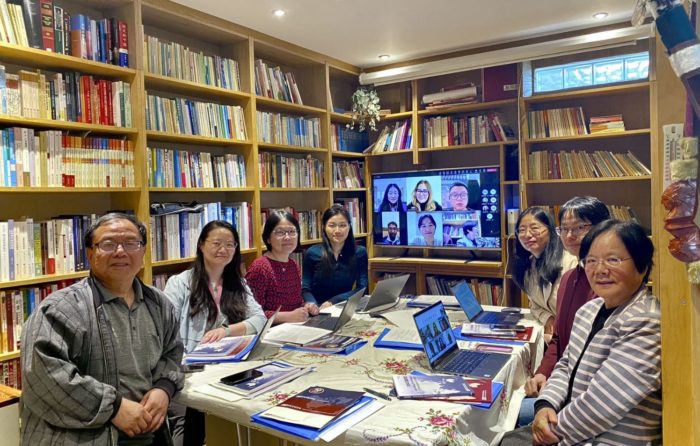
GCA Supports London’s 2nd China-Focus Research Forum (8 June 2024)
Following the 1st China-Focus Research Forum held on May 11th, 2023 (click here to find related news and photos), at SOAS, University of London, organized jointly by the student societies with support from the language teaching staff of SOAS, LSE, and King’s College London, the 2nd China-Focus Research Forum was held at the Global China Academy Centre both offline and online on June 8th, 2024.
Programme
Date and Time: 8th June 2024, 1-5 pm BST
Location: Global China Academy
Chair: Zhonghan Lin, PhD candidate in the School of Education, Communication & Society at King’s College London
1:00 – 1:10 pm Opening speech & warming up
1:10 – 1:35 pm
‘The Future of China’s Global Influence: A Theoretical Analysis of Peaceful and Conflictual Trajectories’
by Subham Kumar Kanu, The Maharaja Sayajirao University of Baroda, Vadodara, Gujarat, India
1:35 – 2:00 pm
‘The Baby-Eating Barbarians: Imagining and Constructing Chinese Images of Europeans in Late Ming and Early Qing Period’
by CHAN Pui To, Jack, The University of Hong Kong
2:00 – 2:25 pm
‘Cultural Conflict, Agency, and Muslim Hui Women’s Trajectories in Chinese State-Run Education’
by Gao Beibei, King’s College London
2:25 – 2:35 pm Special addresses:
- Professor Xiangqun Chang, President of the Global China Academy (GCA)
- Associate Professor XU Haiyan, Nanchang University; Editor of Journal of Chinese for Social Sciences (JCSS)
2:35 – 3:00 pm Break
3:00 – 3:25 pm
‘Geopolitics of Technology and China’s Ascendancy in Militarizing AI and its Implication in the Indo-Pacific: A Comparative Study of India-China in the Field of Militarization of AI’
by Agniva Ray, Jadavpur University, India
3:30 – 3:55 pm
‘Navigating the Waves: China’s Lawfare in Maritime Domain’
by Vibha Ghaty Sreesh, Rashtriya Raksha University, India
3:55 – 4:20 pm Break
4:20 – 4:45 pm
‘China’s Approach to Dispute Resolution: Are the International Commercial Courts of China (CICC) Part of China’s ‘Grand Strategy’ to Challenge the Current Structure of International Arbitration Regulations and Institutions?’
by Maria Anna Sampson, King’s College London
4:45 – 5:00 pm Closing remarks
by Dr. Hongfen Zhou, Team Leader for East Asian and South Asian Languages at the Language Centre, King’s College London
Related photos
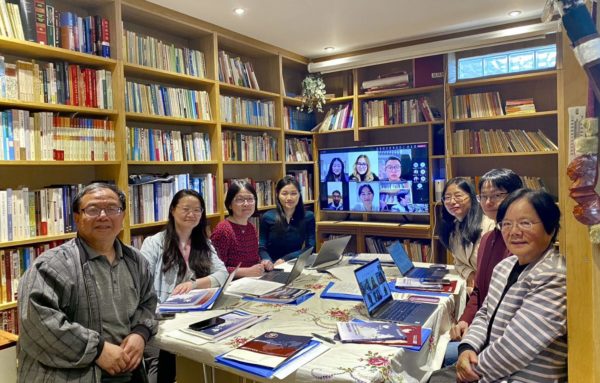
The offline venue was at the Global China Academy Centre. From left to right: Dr. Lianyi Song (SOAS), Dr. Jing Chu (KCL), Dr. Hongfeng Zhou (KCL), Zhonghan Lin (Chair, KCL), Associate Professor Xu Haiyan (Nanchang University, China), Dr. Lijing Shi (LSE), and Professor Xiangqun Chang.

Some presenters. From left to right: Subham Kumar Kanu, CHAN Jack Pui To, Gao Beibei, Agniva Ray, Vibha Ghaty Sreesh, Maria Anna Sampson, Chunjin Li.

Selected presentations. The significant features of this Forum are the global participation including three from India and broader themes compared to the 1st Forum, where the participants were primarily based in London and from SOAS.
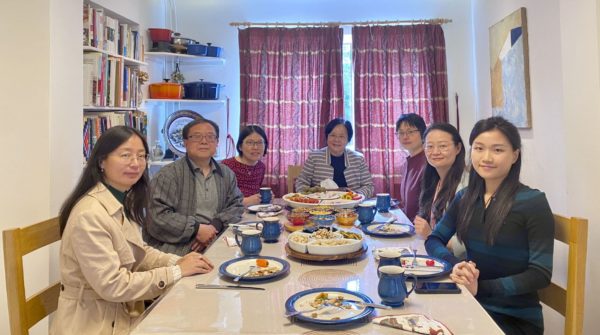
Tea break: Participants enjoyed Zongzi dumplings as June 10th, 2024, closed to the Dragon Boat Festival.
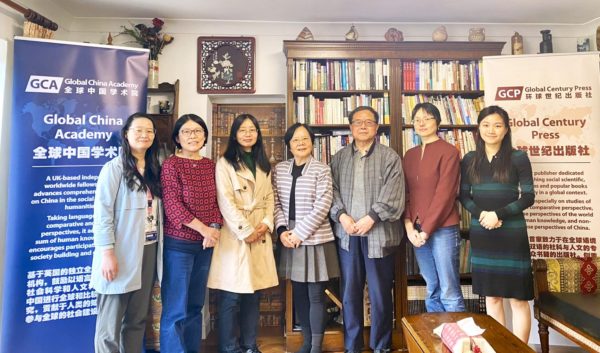
The participants were primarily the Editorial Board members of JCSS. They discussed issues related to the journal.
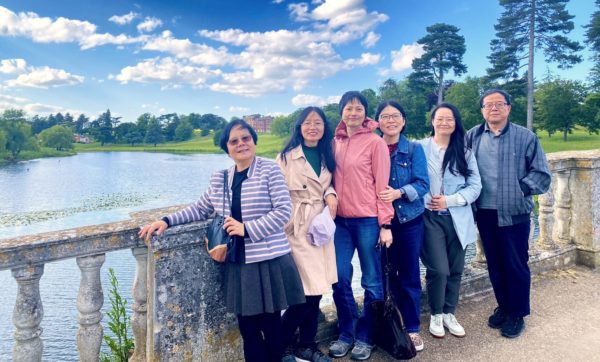
After the forum, participants visited Brocket Hall and enjoyed a walk and dinner there.
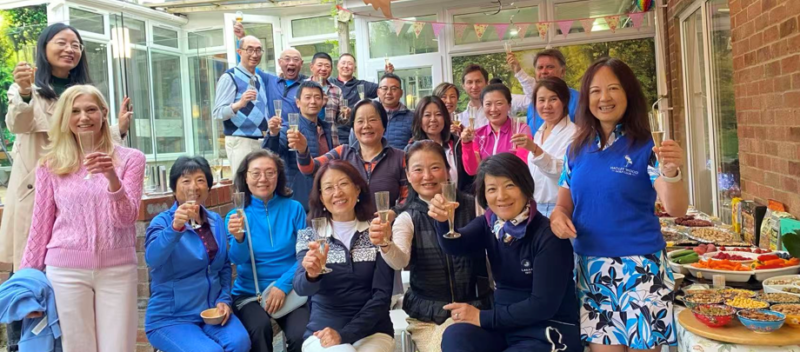
Advancing the Social Mission through Public Engagement and Community Building
In June 2024, the Global China Academy continued to advance its social mission by engaging in and organising activities that foster cultural exchange, community building, and public good across diverse social settings.
21st June, Professor Chang Xiangqun, President of the Global China Academy, and Ms YU Li, Project Manager, were invited to attend the 6th Anniversary Champagne Reception and the 20th Anniversary Charity Antique Auction of Mother’s Bridge of Love (MBL) hosted by the Chinese Collectors Club (UK). The event took place at the Whisky Club, 1A Bond Street. After a splendid pipa solo performance by the renowned artist CHENG Yu, the charity auction was hosted by Mr. Zhang Pu, Chairman of the Chinese Collectors Club (UK). All proceeds, amounting to £13,000, were donated to Mother’s Bridge of Love to express gratefulness to the MBL for funding the establishment of 28 children’s libraries in rural and urban areas of China and providing cultural consultations and support for families in 27 countries that have adopted Chinese orphans, helping Chinese orphans.
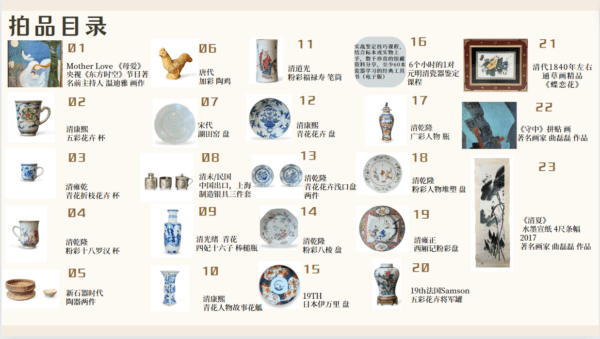
Auction Catalog.
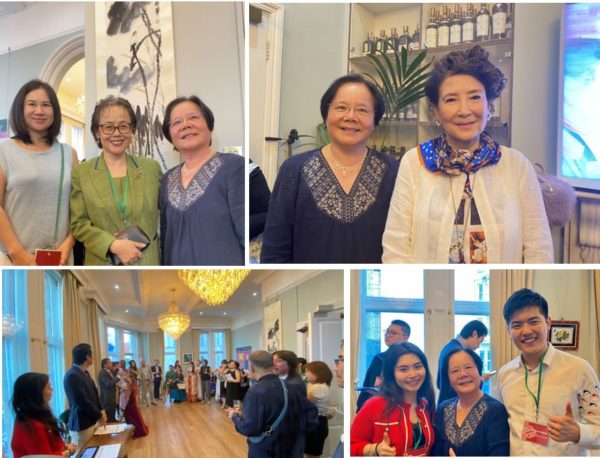
Top left: Xiangqun Chang and Yu Li with Xinran (middle), the founder of MBL. She was one of the panelists at the 1st Global China Dialogue in 2014. Top right: Xiangqun Chang with Jung Chang, author of Wild Swans (1991), Mao: The Unknown Story (2005), and Empress Dowager Cixi (2013). Bottom left: Pu Zhang hosted the auction. Bottom right: Xiangqun Chang met Fellows of The Sociological Review, Dr. William Zhengdong Hu and his wife, who were volunteers there.
On 9th June, with the help of Mr. Kai Liang, Ambassador of Hampton Court Golf Club and Event Officer of GCA, we organized 9 pairs teams to participate in the Mill Hill Mixed Open. Some of them won 1st, 2nd, 4th, 5th, and 6th places, as well as the longest drive. After dinner and prize giving, a Champagne Reception was held at the GCA Centre. The successful event served multiple purposes: mixing Chinese and non-Chinese players, celebrating Tao Liu’s Albatross (three strokes under par on a single hole), and the Chinese Dragon Boat Festival.
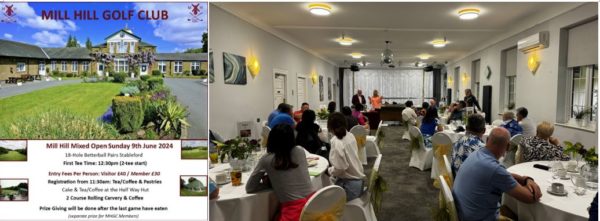
Mill Hill Mixed Open and its dinner and prize giving.
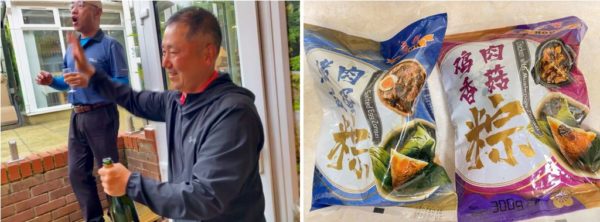
Left: Kai Liang hosted the Champagne Reception and Tao Liu opened a bottle of Champagne. Right: different varieties of Zongzi dumplings.
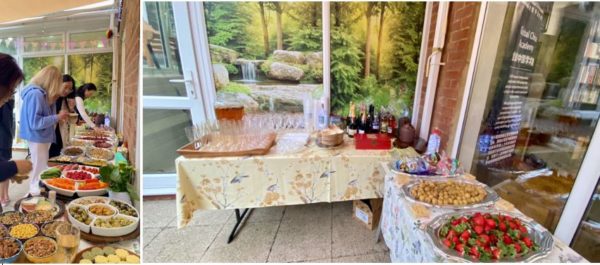
Everyone enjoyed the drinks, soft fruit and snacks.
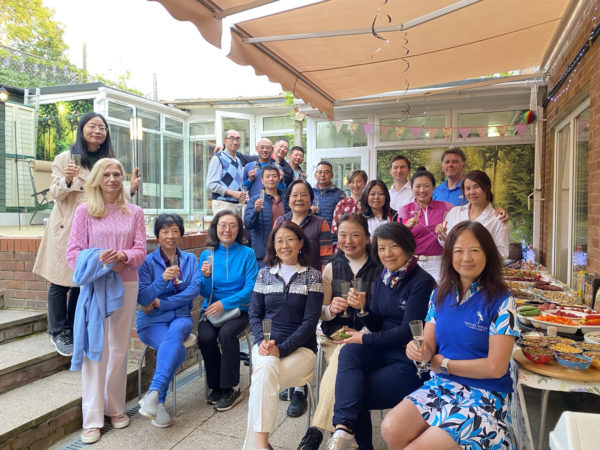
Cheers to Tao Liu and to our gathering!

The event lasted until midnight. It was a wonderful celebration of camaraderie and cultural exchange. We look forward to more successful events in the future, bringing together diverse communities in celebration and fellowship.
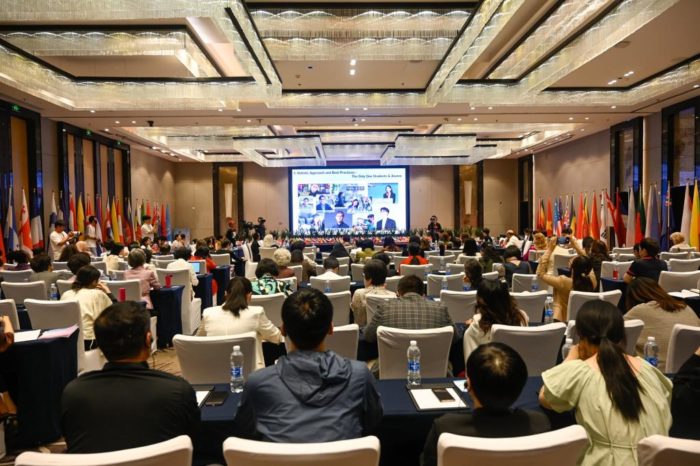
Global China Academy Board of Trustees’s Chair Participates in the 11th WWUPF in Zhengzhou, China, May 25-29, 2024
Maria Jaschok 12 June 2024
On Attending
The 11th World Women University Presidents Forum (WWUPF) 2024,
held in Zhengzhou, Henan, May 25th–29th.
What better way for this new chair of the GCA Board of Trustees to introduce herself, albeit in a rather brief and generally worded presentation, than by means of an academic, which is also a most personal, gendered lens through which I tend to observe, filter, and interpret the complex and divergent realities around me. I have just returned from China where one of my tasks was participation in the 11th World Women University Presidents Forum (WWUPF). An initiative of the Communication University of China (CUC), the WWUPF was launched in August 2001. Its aim is ‘to pool the strength of women university presidents all over the world and to create an international platform for them to communicate and collaborate, and to share new ideas and thoughts in the fields of higher education development and women leadership promotion’ (Brochure, Communications University of China/Huanghe S&T University, 2024).
In addition to ten fora in China, eleven sub-fora have been held around the world. In just over ten years of internationally oriented female-gendered academic discourses, by now with a notable track-record of intellectual and transformative traction, the WWUPF has accumulated considerable credibility. The annual fora clearly benefit from cross/multi-disciplinary and intersectional expertise, and the quality of discourses around significant, topical core themes and critical policy fault lines relevant to gender and Higher Education have garnered close attention from international institutions, as evidenced by the annual participation of representatives from UN agencies and various multilateral organizations.
The 2024 Forum took place in Zhengzhou, Henan, and was dedicated to the theme of ‘Multicultural Backgrounds and Common Development. The Responsibility of Higher Education Leadership.’ Senior UN and UNCESCO leaders sent messages of support which were live-streamed as part of a festive and wide-ranging commencement ceremony which heralded a four-day event of keynote speeches, presentations, and discussions. Artistic performances, exhibitions, and visits to museums and historic sites in Henan rounded off informative cultural excursions, making evident once more the significance of the notion of 中原 zhongyuan culture in relation to the current Chinese government focus on national cultural confidence 文化自信 wenhua zixin.
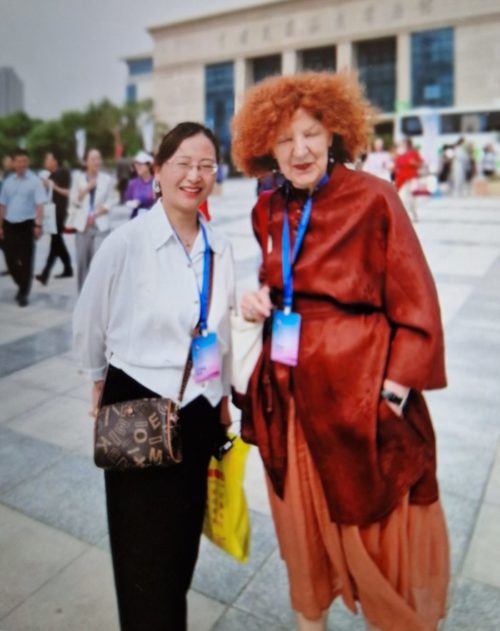
I participated in a panel organized around issues of ‘Openness of Higher Education and Continuity of Civilization’ with a paper on “Studying Elsewhere – cultures of pedagogy, traditions of learning, and fault lines of communication.” The images accompanying this text may help convey the atmosphere of an event that brought together academic, administrative, and political leaders for serious purposes, including many outstanding women leaders of diverse higher education institutions from around the globe. However, most notable was the frequently reiterated pride expressed by Forum participants from such a diversity of national, ethnic, political, and academic backgrounds, a shared pride in having created a meaningful consensus on the importance of an initiative that continues to make a difference despite remarkable global and local challenges.
The transformative powers of female education and its relevance to furthering the SDGs adopted by the UN in 2015 are near-universally shared principles, driving facilitation of enduring institutions for gender justice. Yet such principles are also heavily contested, in certain contexts negated as detrimental to societal development. The WWUPF provides ongoing campaigns for female education at the highest level with solid evidence of the positive impact of capable female leadership in senior positions as it continues to challenge the ongoing underrepresentation of authoritative female voices. The founding initiative for these timely fora, and now their increasingly impactful linkages with international academic institutions and networks, originated from Professor Liu Jinan, then the female president of CUC, making the global mission of the WWUPF all the more remarkable and poignant.
Lastly, but by no means least, for me the most profound and moving experience, both at a personal and autobiographical level, was my return, after an absence of five years, to a part of China with which I had been intensely involved for well over twenty years of research and fieldwork. It was gratifying to have the opportunity once again to listen, interact, learn, observe, and renew contact with old friends and colleagues, whose friendship, knowledge, and incredible generosity are inextricably linked with my understanding of Chinese society.

Photos sources: https://www.hhstu.edu.cn/info/1052/22194.htm, https://news.xmu.edu.cn/info/1003/471011.htm; text provided by the participant.
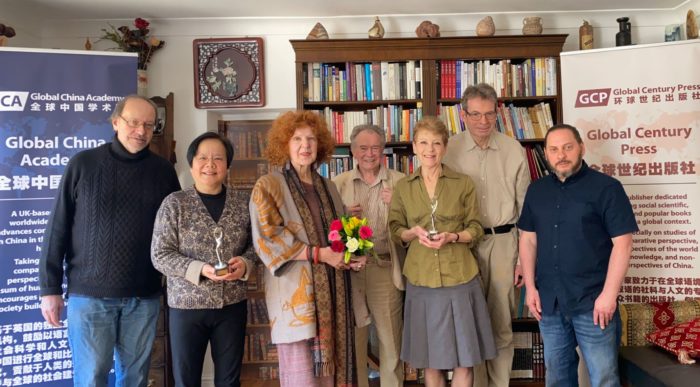
Leadership Transition, Dialogue and Outreach: GCA Activities in May 2024
At the GCA Board of Trustees meeting on February 23, 2024, an important agenda item for the Any Other Business (AOB) session was to schedule the Summer meeting for May 9. The session will welcome the new Chair and Secretary, and bid farewell to the outgoing Chair and Secretary.

On May 9, all the Trustees participated in the hybrid meeting. From left to right: Xiangqun Chang, Mark Lee (who joined the meeting after being elected Trustee and Secretary), Grace Yuan Cheng (online), Thomas Clarke, Maria Jaschok (new Chair), and Charles Grant.

Top left and right: Professor Maria Jaschok, representing the Trustees, thanked the former Chair, Ingrid Cranfield, and presented her with an ‘Oscar’ as a token of their appreciation for her work with GCA and GCP. The former Secretary, Dr. Francis Wood, was unable to attend due to illness. Professor Xiangqun Chang received the ‘Oscar’ on her behalf and will present it to her in due course.
Bottom photos on the left and right: Professor Martin Albrow, the Founding and Honorary President of GCA, presented flowers to Professor Maria Jaschok, the new Chair of the Board of Trustees, and welcomed Mark Lee to support GCA. The photo in the middle signifies the GCA’s Board of Trustees continuing the past and forging ahead.
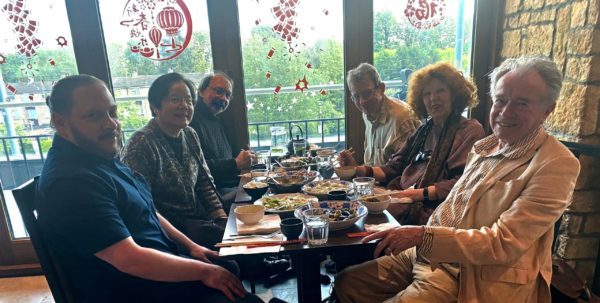
After the meeting, some participants of the GCA Board meeting decided to experience the newly developed GCA’s Route 6 of the Six ‘walk and talk’ routes, which included tea and lunch. The above photo shows them having lunch at the Real China Restaurant at the Galleria Outlet Shopping Centre in Hatfield.
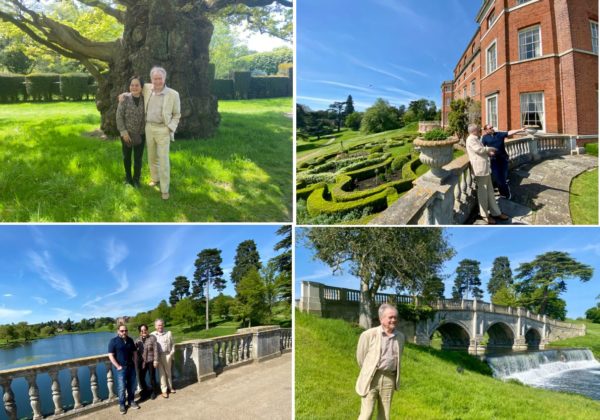
Professor Martin Albrow, Professor Xiangqun Chang, and Mark Lee enjoyed their walk and talk at Brocket Hall very much after the lunch.

On the following day, Professor Xiangqun Chang visited Ingrid Cranfield’s home. She enjoyed Ingrid’s homemade cake, summer fruit, and relaxed conversation, especially the observations of her pet peahen and chicken. Although pigeons typically symbolize peace, the harmonious coexistence of these pets could also represent hope for humanity.
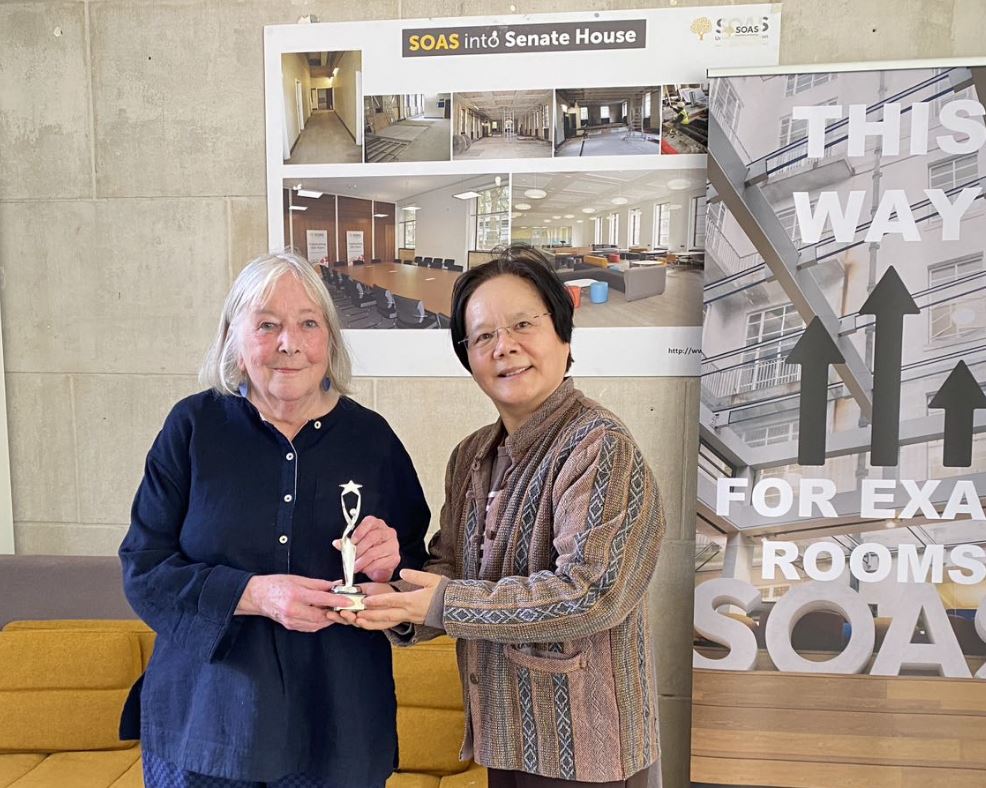
On the occasion of participating in a public lecture entitled ‘The Construction and Development of Digital Dunhuang’ on the 29th of May at SOAS, Professor Xiangqun Chang had a meeting with Dr Frances Wood. She greatly appreciated Dr Wood’s continued support for GCA and GCP with her academic and professional expertise in her personal capacity in the future. Professor Chang expressed gratitude for Dr Wood’s contributions to GCA and GCP in the past years and presented her with an ‘Oscar’ on behalf of the Chair of the Board of Trustees.
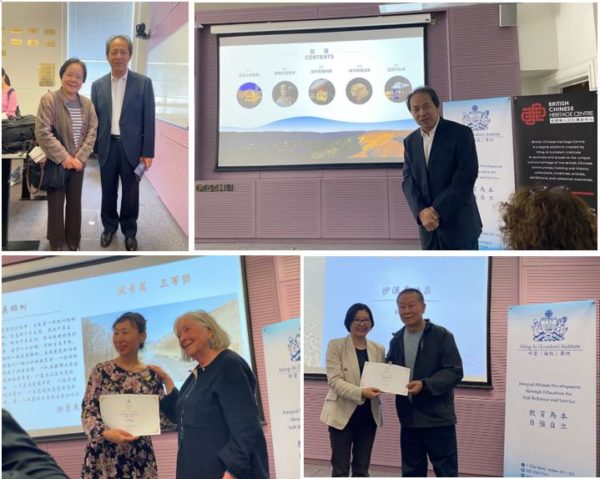
Top left: Professor Xiangqun Chang with WU Jian, Professorial Research Fellow of the Dunhuang Institute, the speaker of ‘The Construction and Development of Digital Dunhuang.’ They discussed the possibilities of a collaborative publication project on the theme of transculturality based on a vast amount of digital materials.
Top right: Professor Wu Jian gave a public lecture. According to him, Dunhuang was an important cultural node on the ancient Silk Road in China, witnessing the exchange and integration of Eastern and Western cultures. After more than 30 years of exploration and research, Digital Dunhuang formed a complete technological process suitable for the digital collection, processing, and storage of immovable cultural relics, and methods for constructing Digital Dunhuang, showcasing massive digital achievements and application scenarios of Digital Dunhuang. This lecture focused on the artistic value inheritance of the Dunhuang Grottoes, aiming at the digital preservation of cultural heritage for its sustainable inheritance. It started from the significance of advanced digital technology empowering cultural heritage protection and inheritance and discussed the development, achievements, and innovations in the three important stages of digital protection of Dunhuang Grottoes.
Following the public lecture, there was the Digital Photography Exhibition ‘Dream Back to Dunhuang.’ The bottom photos show Dr. Frances Wood (left) and Mr. Qu Leilei (right), the UK-based artist, presenting certificates to the winners of the Digital Photography Exhibition.
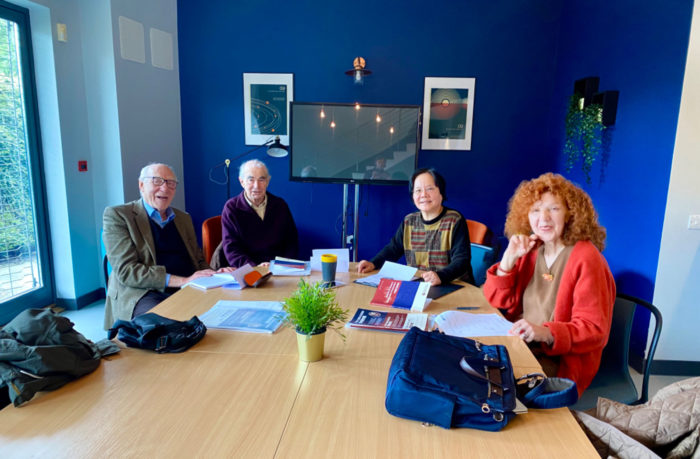
Global China Academy’s Activities in April 2024
On April 17, Professor Xiangqun Chang visited GCA Fellows at the University Club at Oxford. The fellows are Professor David Parkin, Professor Robin Cohen, and Professor Maria Jaschok. In the morning, they conducted a broad range of discussions. During lunchtime, in addition to discussing work, Professor David Parkin suggested that we should also add a little living to our life. In the afternoon, Xiangqun and Maria discussed detailed work on the GCA Board of Trustees. It was a very productive day.
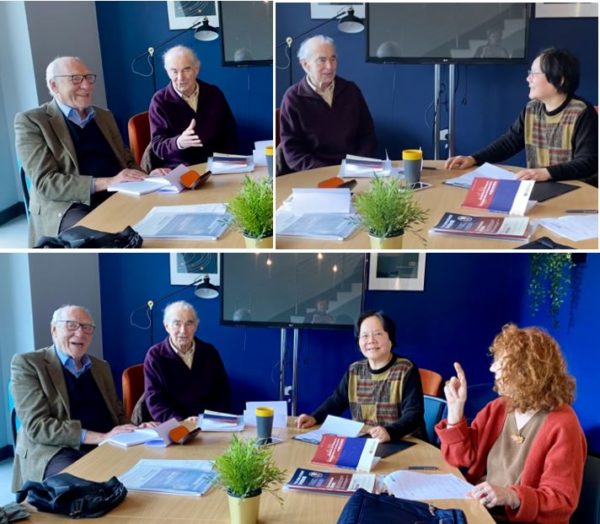
From left to right: Robin Cohen, David Parkin, Xiangqun Chang, and Maria Jaschok. The discussion meeting was similar to a brainstorming session. Based on incomplete audio records, the following topics were covered:
- Transculturality:
- Definition and examples of transcultural practices.
- The concept of transculturality as a tool for understanding global dynamics beyond globalization.
- Comparison between Chinese and Western approaches to transculturality.
2. Reciprocity and Social Exchange:
- Different types of reciprocity: generalized, balanced, and negative exchange.
- The role of reciprocity in social relationships and its implications in different cultural contexts.
3. Academic Contributions and Challenges:
- The need for a Chinese school of sociology and its contributions to global social science.
- The challenges faced by Chinese academics in the global academic landscape.
- Strategies for integrating Chinese perspectives into global academic discussions.
4. Social Practices and Their Cultural Significance:
- The influence of Chinese cultural practices on social relationships and community building.
- Examples of social practices in Chinese villages and their implications for social structure.
5. Historical and Comparative Studies:
- Comparative studies on modernization in different countries.
Historical encounters between Europe and China and their impact on cultural exchange. - The role of Chinese academics in documenting and analyzing these historical interactions.
6. Globalization and Modernization:
- The evolution of globalization and its various forms.
The concept of modernization in China and its comparison with Western perspectives. - The impact of globalization on local cultures and practices.
7. Role of Chinese Women and Feminism:
- The development of Chinese feminism and its integration into global feminist discourse.
- Historical perspectives on Chinese women’s roles and contributions.
8. Networking and Collaboration:
- The importance of collaborating with similar institutions to sustain the mission of the Global China Academy.
- Potential partnerships with organizations like the United Nations Alliance of Civilizations (UNAOC).
9. Impact and Sustainability of the Global China Academy:
- Strategies for ensuring the sustainability of the academy.
The role of publications and academic dialogues in promoting the academy’s mission. - The importance of engaging younger generations in the academy’s work.
10. Fieldwork and Ethnographic Studies:
- Personal anecdotes and experiences from fieldwork in China.
- The significance of understanding local contexts and social dynamics through ethnographic research.
11. Political and Cultural Mapping:
- The role of maps in representing cultural and political relationships.
- The influence of mapping practices on understanding global connections and power dynamics.
12. Challenges of Publishing Uncensored Chinese Work:
- The difficulties in publishing authentic, uncensored academic work on China.
- The role of the Global China Academy in providing a platform for such publications.
13. Global Governance for AI:
- This is the theme of the 9th Global China Dialogue, which will take place at Tongji University in China. It is the first time the event will be held in China, and it will alternate between the UK and China in the future.
- The preparations are ongoing.

Global China Academy Council Chair Professor Tony McEnery’s Academic Activities in Hong Kong and China, March to April 2024
Introduction
In 2024, Professor Tony McEnery’s academic activities expanded in various ways. On the one hand, he led a team from Lancaster University to Xi’an Jiaotong University, establishing academic relations between the two universities in March. On the other hand, his influence extended from Xi’an, Zhejiang, and Shanghai to Kunming and Hong Kong where he gave conference paper and distinguished lecture respectively in April.
Timeline
On the 1st March, Tony McEnery from Lancaster University led a delegation to visit Xi’an Jiaotong University, discussing collaborative opportunities with the School of Foreign Studies and the International Cooperation and Exchange Office. The meeting included Professors Paul Baker, Elena Semino, and Jonathan Culpeper, along with Lei Yanjun, Deputy Director of the International Cooperation and Exchange Office, and leaders from the School of Foreign Studies at Xi’an Jiaotong University. The discussions focused on the shared goals and strategies of joint educational programs, including curriculum development and faculty training. Both sides expressed a desire to deepen the partnership based on their existing collaboration. Lancaster University is ranked 122nd in the 2024 QS World University Rankings and 10th globally in linguistics. Since 2021, the two universities have collaborated on various projects, including the Ministry of Science and Technology foreign expert program and the ‘High-End International Expert Masterclass’ series. This visit aimed to further consolidate their strategic partnership.
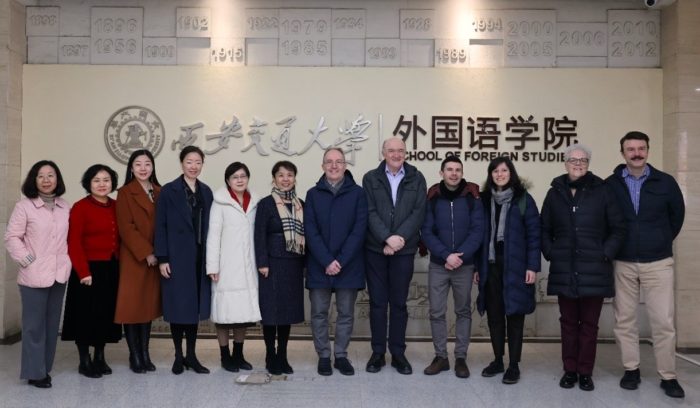
Source: https://news.xjtu.edu.cn/info/1005/206782.htm
Later the morning, the Foreign Language and Culture Forum at Xi’an Jiaotong University was held, featuring three primary speakers: Professor Elena Semino from Lancaster University, a Fellow of the British Academy of Social Sciences and the Royal Society of Arts, and Director of the ESRC-CASS Research Center; Professor Tony McEnery, a leading international scholar in corpus linguistics and a Distinguished Professor at Lancaster, who also serves as a guest professor at Xi’an Jiaotong University; and Vittorio Tantucci, the China Collaboration Officer for Lancaster University’s Department of Linguistics and English Language.
Professor Semino (top left) gave a lecture titled “Disease and Metaphor.” Using collected data and corpora, she demonstrated the metaphors used to describe different disease experiences and noted that the effectiveness of metaphors depends on how they are expressed. She emphasized that understanding metaphorical expressions relevant to different healthcare stakeholders is crucial for their practical application in disease treatment. Professor McEnery (top right) discussed the expression and usage of “swear words” in English dialogues from a discourse analysis perspective. He emphasized the importance of understanding the discourse structure of such forms and their effects in particular contexts. Afterward, attendees had a lively discussion with him on cultural differences in the use of this language. Dr. Tantucci (bottom left) provided an overview of Lancaster University and its Department of Linguistics and English Language, detailing its primary research areas. He also elaborated on the collaborative master’s program in English Language and Literature between Lancaster University and Xi’an Jiaotong University.
The forum stimulated enthusiasm among attendees for linguistics, particularly data-driven linguistic research, providing a platform for students and faculty to broaden their academic horizons and gain knowledge of the latest research trends.

Source: https://sfs.xjtu.edu.cn/info/1244/7284.htm
In the afternoon, the ‘Foreign Language and Culture Forum’ organized by the School of Foreign Studies was successfully held. The forum featured Professor Jonathan Culpeper, head of the Department of Linguistics and English Language (LAEL) at Lancaster University, Paul Baker, professor at Lancaster University and a Fellow of the Royal Society of Arts and the British Academy of Social Sciences, and Raffaella Bottini, the Internationalization Director of LAEL. The event was chaired by Vice Dean Cheng Bing and was attended by over a hundred students and faculty members.
This forum combined themed lectures with audience Q&A. Professor Culpeper (top left) delivered a lecture titled ‘Linguistic (Im)politeness and Reciprocity,’ focusing on communication etiquette in daily life. Using numerous examples, he vividly illustrated the differences between polite and impolite language, offering a detailed analysis of the linguistic principles and communication psychology involved. He paid special attention to patterns of conversational reciprocity, revealing politeness strategies and cultural variations. Professor Baker’s lecture (top right), titled “Corpus-Based Discourse Analysis,” explained the application of corpus analysis in linguistic research. He provided many examples demonstrating the unique value of corpus analysis techniques in exploring language usage patterns and uncovering societal and cognitive trends. This sparked interest among attendees in linguistic research methods. Finally, Director Bottini (bottom left) introduced the collaborative exchange program between Xi’an Jiaotong University and Lancaster University. This program offers a broad platform for faculty and students from both universities to collaborate, fostering in-depth academic and educational interactions while supporting international development.
The Foreign Language and Culture Forum not only provided new academic insights but also built an important bridge between Xi’an Jiaotong University and Lancaster University. The academic discussions and program introduction broadened the international outlook of attendees and promoted cross-cultural exchange and understanding. This has injected new vitality and momentum into collaboration between the two universities in education and research. Future cooperation between Xi’an Jiaotong University and Lancaster University is expected to deepen, promoting the development and prosperity of international education.
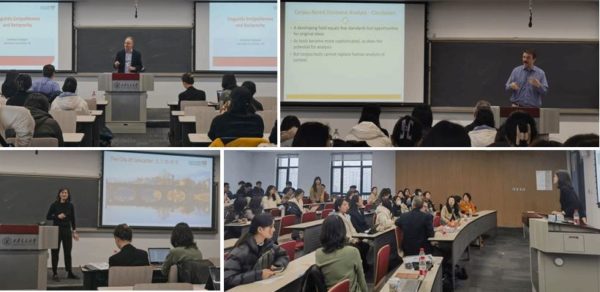
Source: https://sfs.xjtu.edu.cn/info/1244/7285.htm
On the 4th March, Professors Tony McEnery and Paul Baker from Lancaster University delivered lectures at at the School of Foreign Studies, Zhejiang Gongshang University.
Professor McEnery (top left), a renowned expert in corpus linguistics, focuses his research on applying corpora, contributing significantly to sociolinguistics, pragmatics, discourse studies, comparative linguistics, translation, and language teaching. His lecture entitled ‘Swearing, Discourse, and Function in Conversational British English’. He began by introducing academic concepts such as ‘macrostructure’ and ‘microstructure’ in discourse and critiqued existing research flaws concerning swearing and macro discourse structures. Building on this, he outlined the core theme of his lecture. Throughout the lecture, Professor McEnery demonstrated methods and approaches for analyzing swearing using corpora, covering the selection of research data, annotation of natural data, and data analysis and interpretation. He provided in-depth explanations about annotating spoken data, discourse units and functions in swearing analysis, and sequential structures of swearing within macro-narrative structures, sparking reflection and discussion. Lastly, he engaged with the audience on questions like ‘How to handle coding ambiguities?’ His patient and detailed answers benefited everyone greatly.
Professor Baker (top right) gave a keynote speech titled ‘An Overview of Corpus-Based Discourse Analysis.’ The report first emphasized the importance of language in shaping positions, representing identities, and conveying evaluations. He pointed out that analyzing large-scale language data can reveal the cumulative effects of language, leading to his proposed “Corpus-Assisted Discourse Studies” (CADS) approach and introducing the “description-interpretation-explanation-evaluation” research paradigm. In his lecture, Professor Baker highlighted the value of this research approach with four case studies: the image of bachelors in British media, the debate in the British Parliament on fox hunting, patient feedback in the UK’s National Health Service, and British news media’s coverage of obesity. These studies demonstrate the significant value of corpus research methods in helping linguists gain insights into discourse and society and fostering collaboration with other disciplines.
They were chaired by Professor Qian Yufang (bottom right), the lecture attracted many young faculty members, doctoral students, and master’s students who participated and exchanged ideas. The lively and academically rich atmosphere left a strong impression.
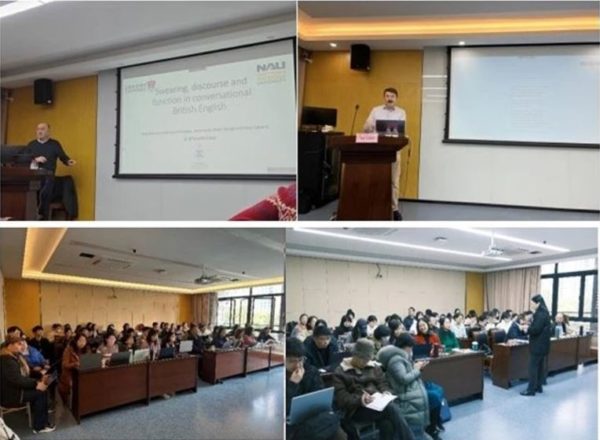
From March 5 to 7, Professor Baker conducted a three-day workshop on ‘Corpus-Based Discourse Analysis’ for the faculty and students of the School of Foreign Studies. The first session discussed ‘Visual Analysis of an Obesity News Corpus,’ primarily focusing on analyzing the interaction between textual and visual elements in The Daily Express’s coverage of obesity. The second session explored ‘Sociological Analysis of Language and Gender in a Spoken Corpus.’ The third workshop centered on ‘Corpus Analysis of Patient Feedback,’ aiming to understand patient feedback in the UK’s National Health Service. The fourth workshop addressed “Keywords in News Corpora.” The workshops were chaired by Professors Li Wenzhong and Pu Jianzhong.
This academic event attracted many faculty members and students, including university staff and undergraduates, master’s students, and PhD. candidates at various stages. The event was fully attended, creating a strong academic atmosphere. The Q&A sessions were especially lively, with attendees asking questions and engaging in discussions. Participants found the experience invaluable, gaining a solid understanding of key corpus discourse research methods and recognizing the importance of choosing research topics, clarifying research questions, collecting data, and determining research approaches
Sources: https://mp.weixin.qq.com/s/yay61_sACX38bDR4bmPs7Q and https://sky.zjgsu.edu.cn/2024/0402/c2108a169400/page.htm
On the 5th of March, as an Advisory Professor (2023-2026) at Shanghai International Studies University (SISU), Professor Tony McEnery delivered a lecture at the Institute of Corpus Studies and Applications at SISU. The lecture, titled ‘Swearing, Discourse, and Function in Conversational British English,’ examined the role of macrostructures in the study of swearing. While macrostructures have been studied in isolation, they have not yet been comprehensively analyzed, and the range of those studied is limited. In contrast, research on microstructures is better developed. Using spoken corpus data from BNC2014, the lecture presented two approaches to studying discourse. The first approach explored spoken data annotated with a functional discourse coding scheme that reveals the distribution of a set of macrostructures (discourse units) that generally characterize conversation. The goal was to observe how swearing is distributed according to discourse unit function and explain any patterns identified. The second approach focused on a single macrostructure of discourse—narrative—and its sub-elements, to determine whether swearing interacts with this macrostructure and its components. The lecture concluded by emphasizing the importance of discourse as a dimension along which the use of swearing can vary, likely in relation to emotion. The complementary perspectives on macrostructure discussed in the lecture further underscore this point.
Sources: https://corpus.shisu.edu.cn/corpusen/ae/dd/c12945a175837/page.htm and https://corpus.shisu.edu.cn/bd/7d/c10015a179581/page.htm
On the 22nd April, Professor Tony McEnery presented paper on ‘Corpus-based View on News Media Representation of Slavery in the 19th Century Britain’ at An International Conference on Brain, Language, and Communication, Kunming, 22-23 April 2024. It was co-organised by School of Journalism (College of International Communication of South and Southeast Asia), Yunnan University, Subcommittee of Journalism and Communication, the South and Southeast Asian University Network, and the Halliday Centre for Intelligent Applications of Language Studies, City University of Hong Kong, in partnership with Yunnan Key Laboratory of Media Convergence.
This conference is organized on the theme of brain, language, and communication. It is motivated by the latest consensus that the interdisciplinary collaboration across the three will generate synergies to enable the sustained growth and development of communication studies and linguistic research, particularly for corpus-based approaches and neurolinguistics. This collaboration is also timely, in response to the latest development in artificial intelligence as well as the initiatives in Nuralink implant research that highlight the interaction across the three important subjects. The event brings together some of the internationally outstanding scholars in linguistics, media communication and data science on their cutting-edge research in the cross-feeding between language, communication, the understanding of the human mind and their statistical models. The conference therefore showcases some of the most recent developments in research topics, methodologies and findings in the relevant areas.
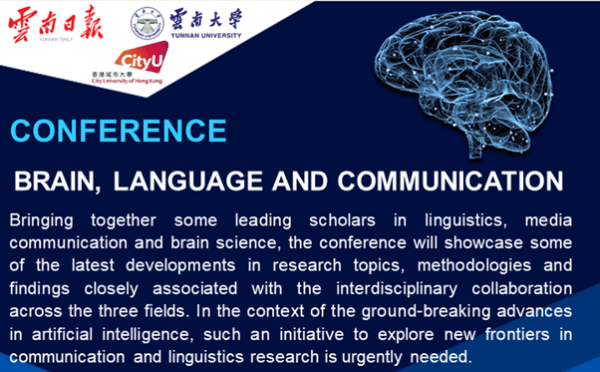
Source: https://hallidaycentre.cityu.edu.hk/12_Kunming_2024.html
On the 26th April, Professor Tony McEnery met with Prof Alex Fang (方稱宇), Director of the Halliday Centre for Intelligent Applications of Language Studies, City University of Hong Kong. They discussed matters related to joint collaborations and dearly remembered those whom they knew in common, including Prof Sidney Greenbaum at UCL, Shichun Gui at Guangdong University of Foreign Studies, Michael Halliday at Sydney and Geoffrey Leech at Lancaster, who inspired them immensely in their corpus-based approaches to language. The Computational Analysis of English (Longman 1987) given by Geoff to Tony and by Shichun to Alex prompted both of them into computational experiments on corpus data using programming languages such as LISP and Prolog.
Source: https://hallidaycentre.cityu.edu.hk/08_news.html
On April 30th, Professor Tony McEnery delivered a Distinguished Lecture in Humanities: ‘AI, Ethics, and the Humanities in the UK,’ at the Faculty of Humanities, The Hong Kong Polytechnic University (PolyU). The lecture surveyed the intersection of artificial intelligence (AI), ethics, and the humanities in the UK. It integrated insights from bibliometric analyses, interviews with various stakeholders, and reviews of existing research infrastructure and policies. The talk examined the current state of AI ethics research in the UK, identifying the contributions of the arts and humanities, the obstacles researchers face, and the potential impacts of their work. It also considered the international research environment and strategic investments made by other countries in AI and ethics, drawing comparisons with the UK’s approach. Opportunities and threats were identified in the contexts of academia, public perception, and commerce, including the impacts of AI on diverse populations and industries. The talk concluded by comparing the situation in the UK with that in Hong Kong.
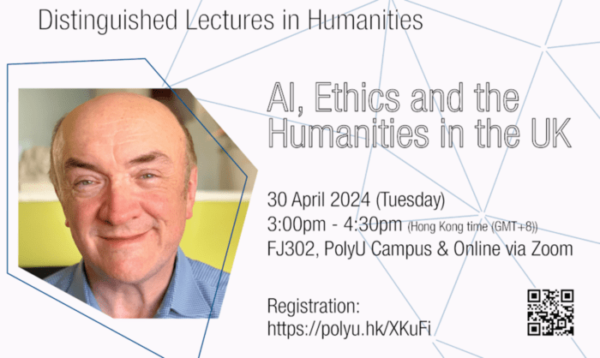
Sources: https://www.polyu.edu.hk/events/2024/4/0430_distinguished-lectures-in-humanities and https://www.polyu.edu.hk/fh/news-and-events/event/2024/4/dlh_20240430
- Click here to view Global China Academy Council Chair Professor Tony McEnery’s Academic Activities in China, September-November 2023.
- Click here to view Global China Academy Council Chair Professor Tony McEnery’s Academic Activities in China, April-May 2023.
- Click here to visit Professor Tony McEnery FGCA page.
- Click here to visit News section.
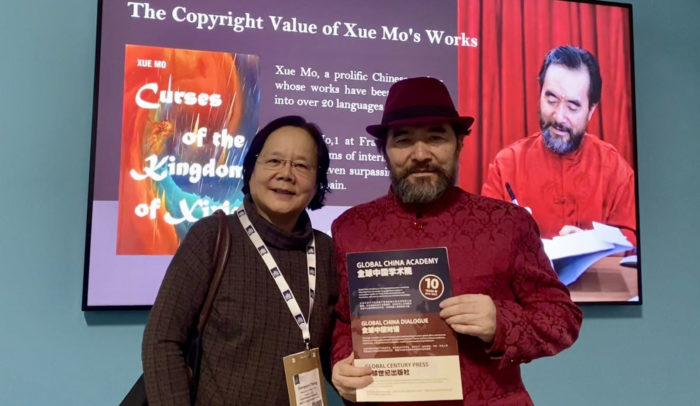
Global China Academy’s Activities in March 2024
There were three types of events that happened in March. They are: participating in the London Book Fair, which is one of two major events for GCA and GCP; the GCA Council and Chinese Council meetings; and GCA team activities.
Note: The text on this page is to be updated.
10 March
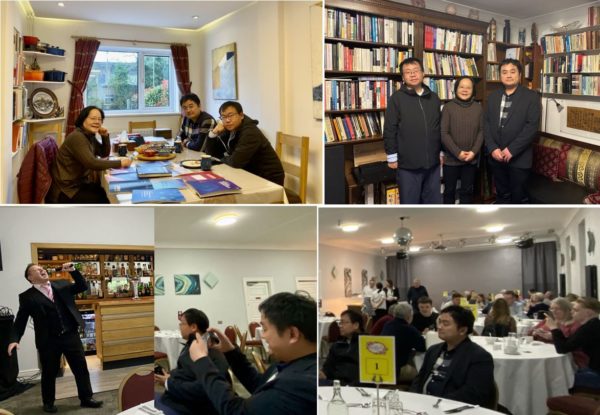
12th March
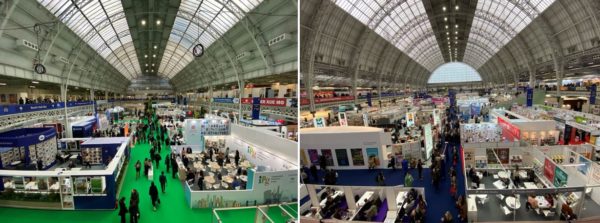

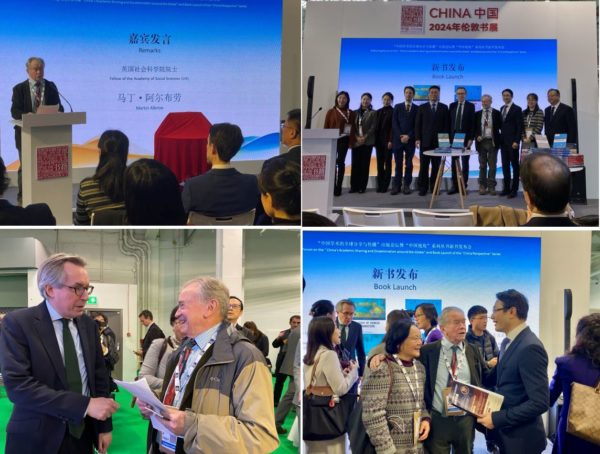
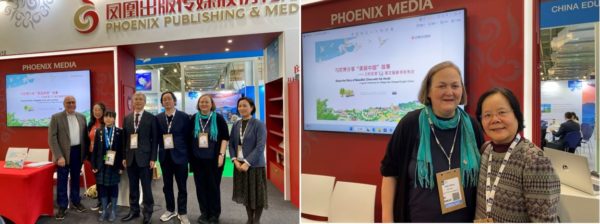
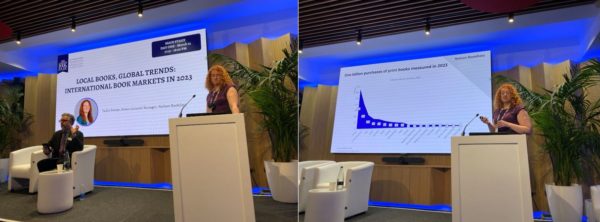
13 March




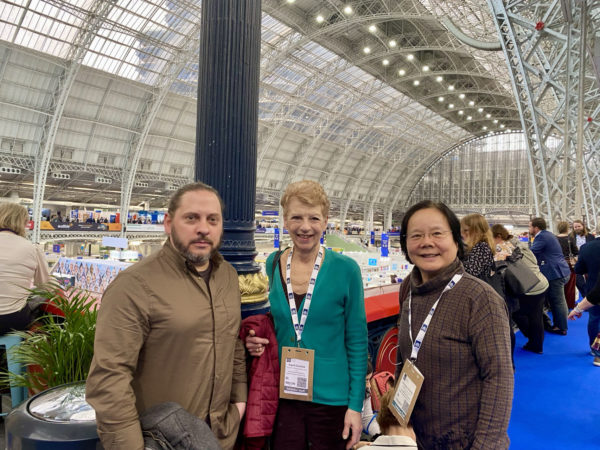
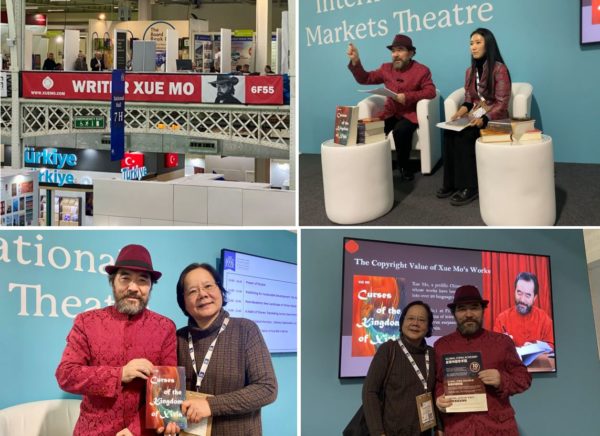
14th March


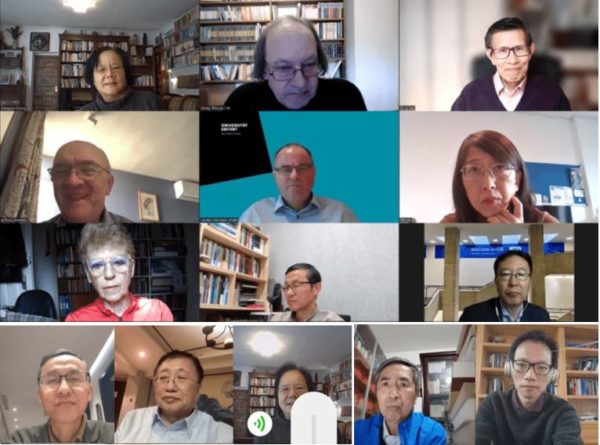
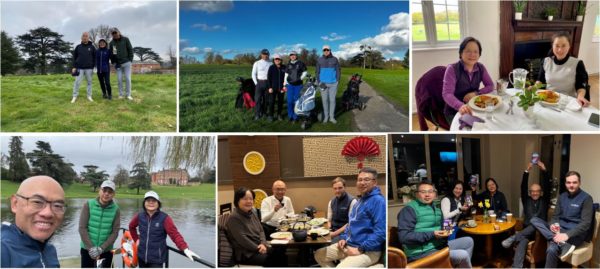
Click here to visit the GCA news & blog section.

